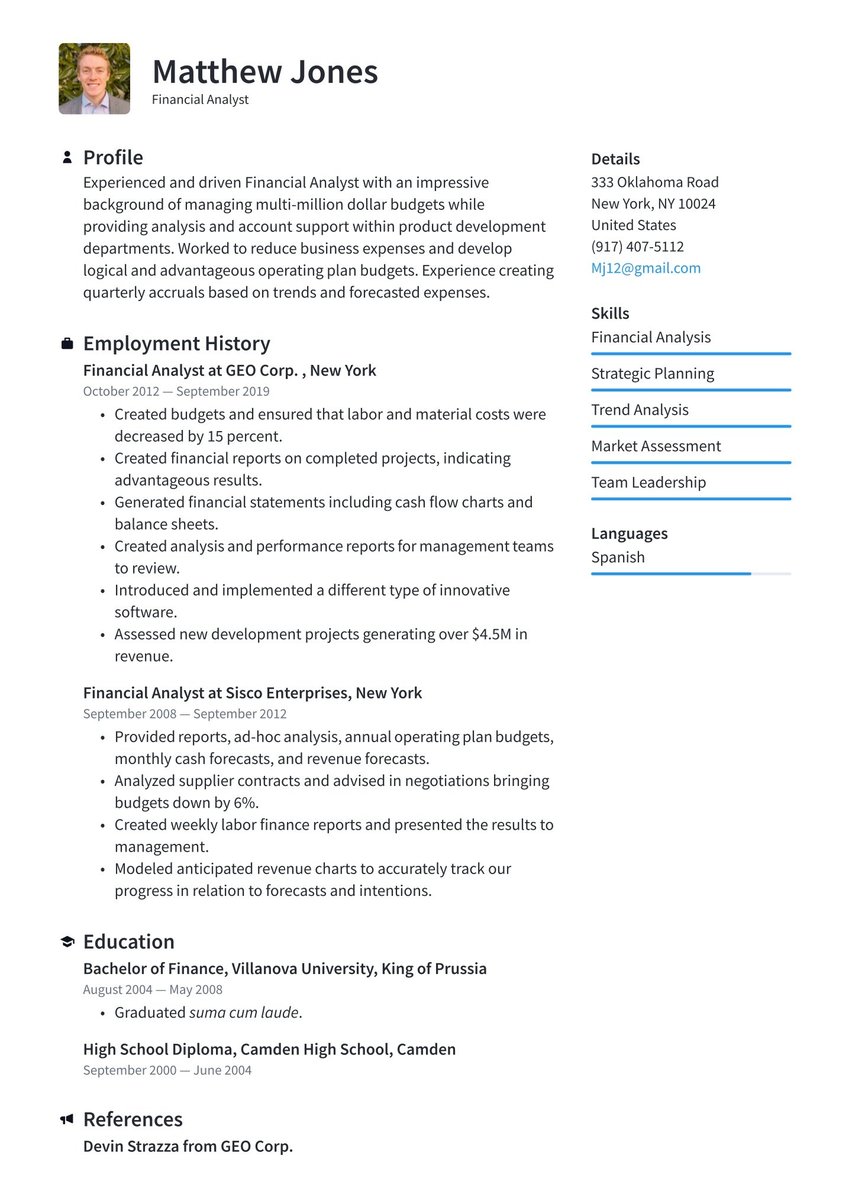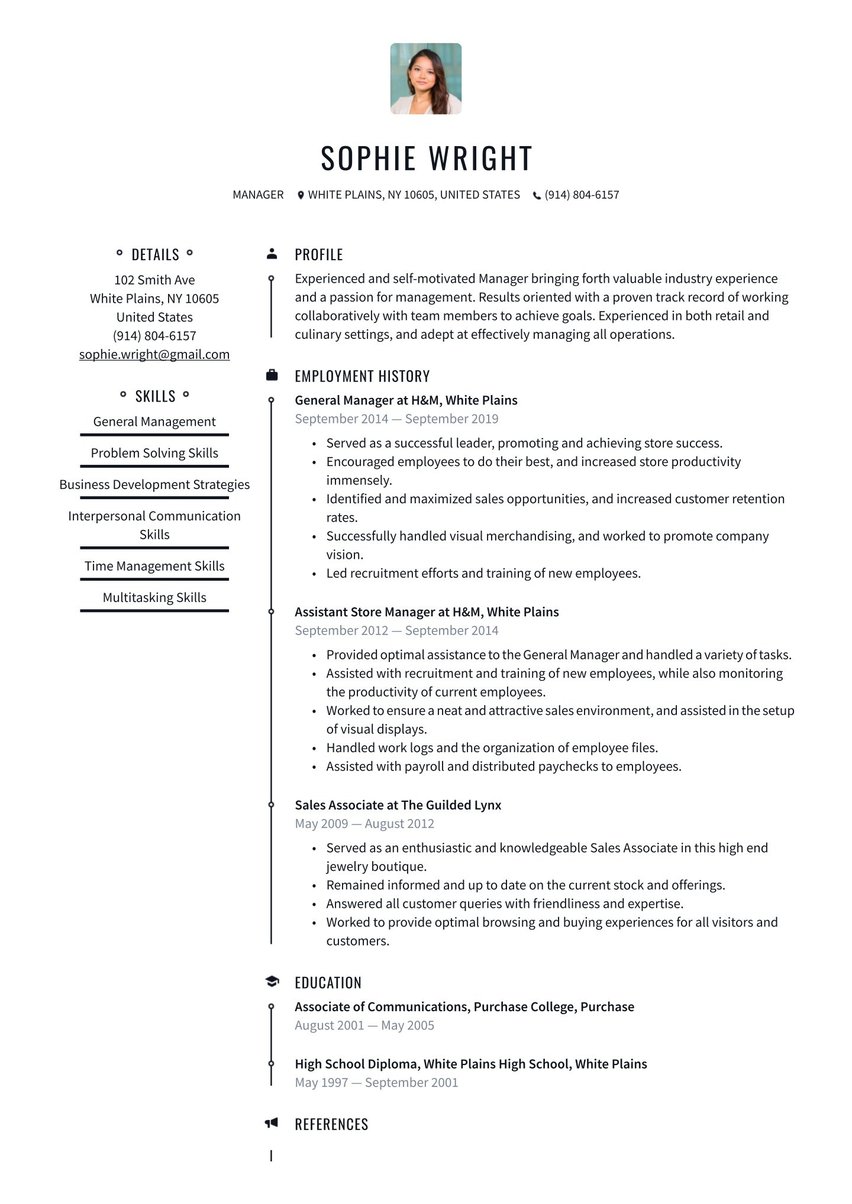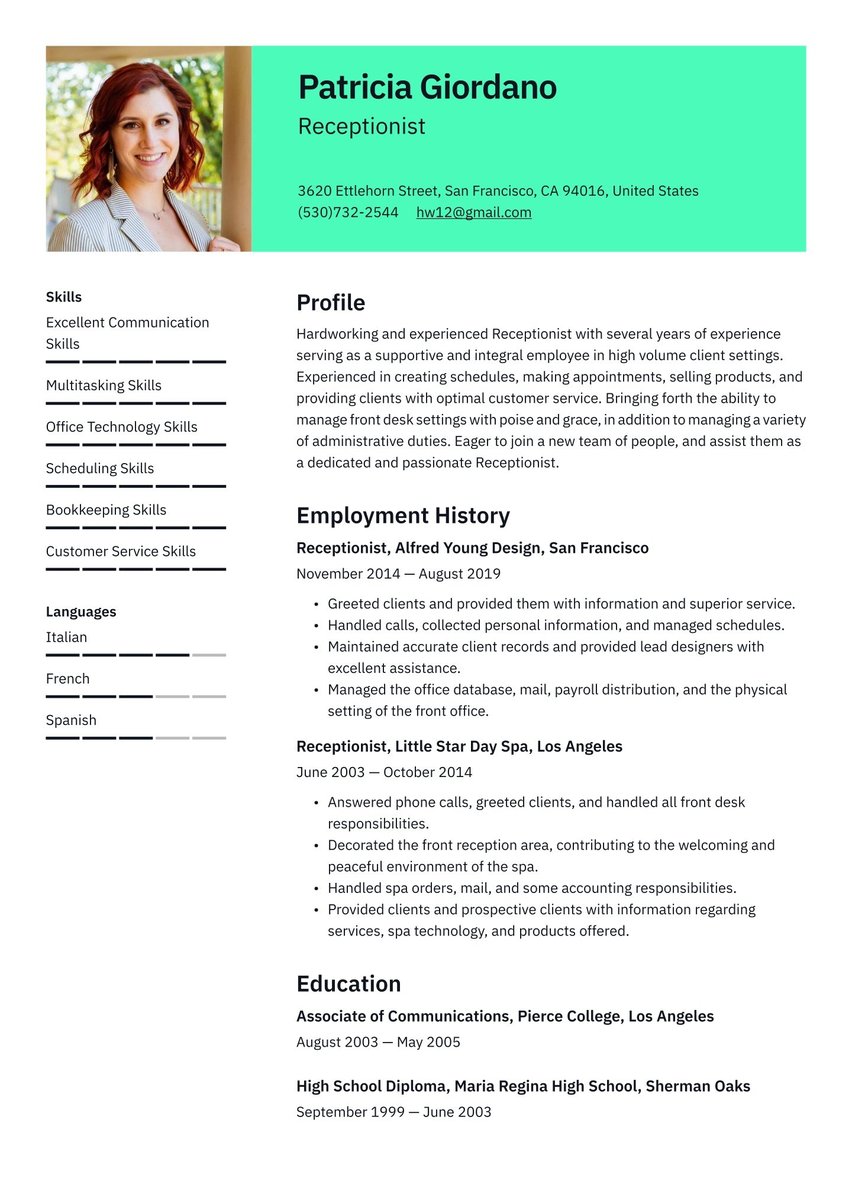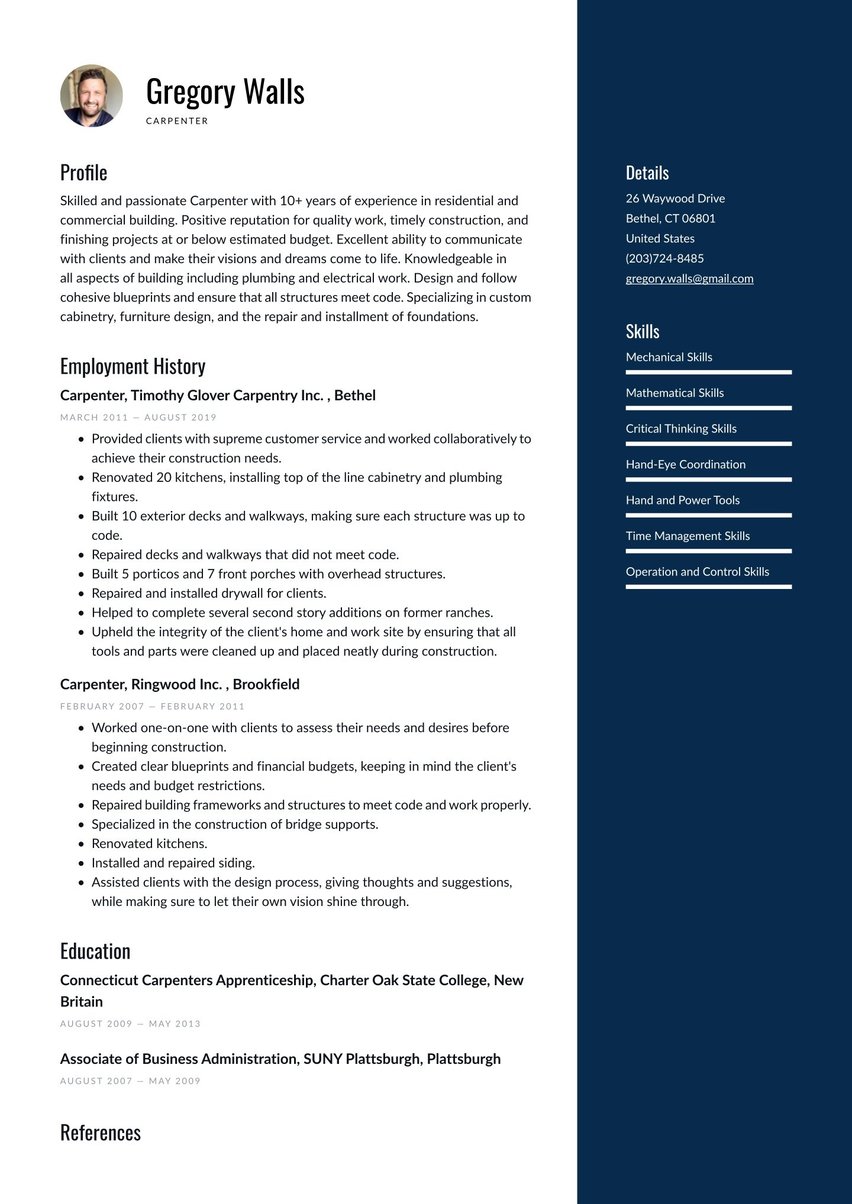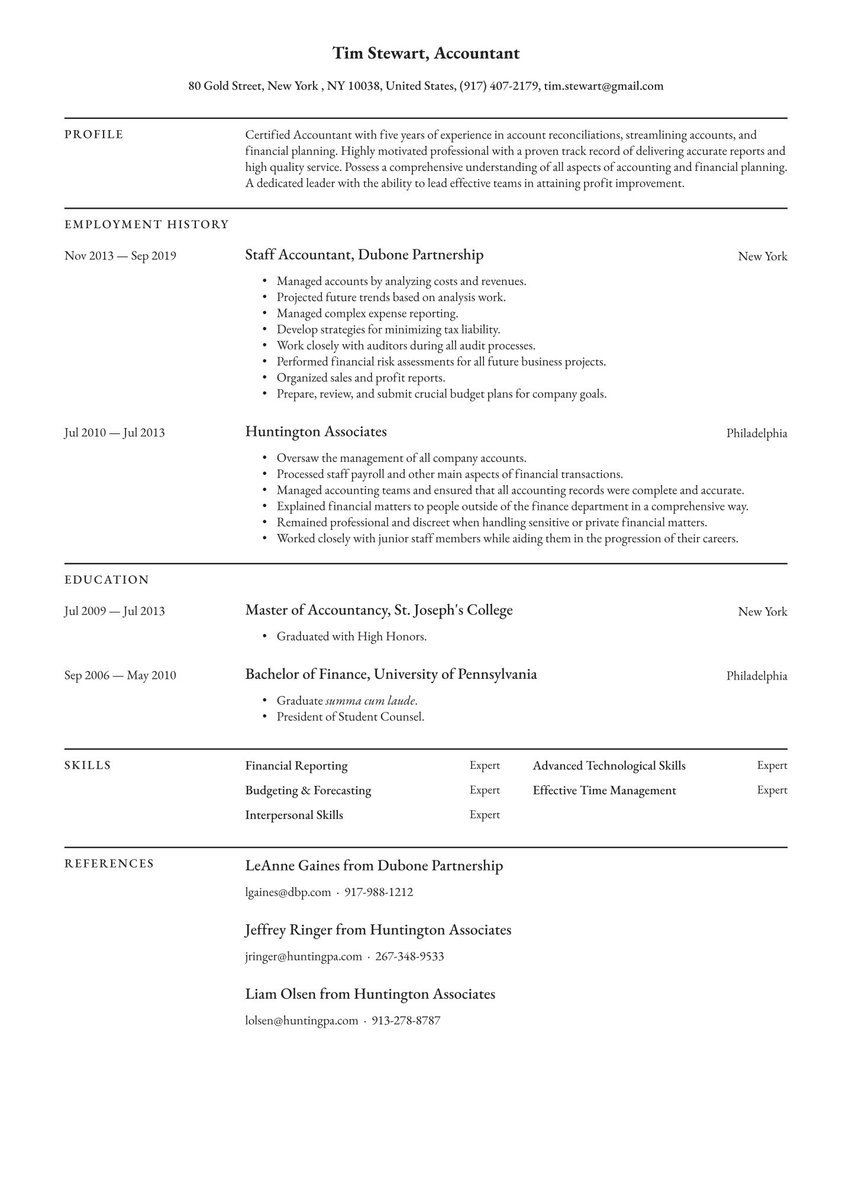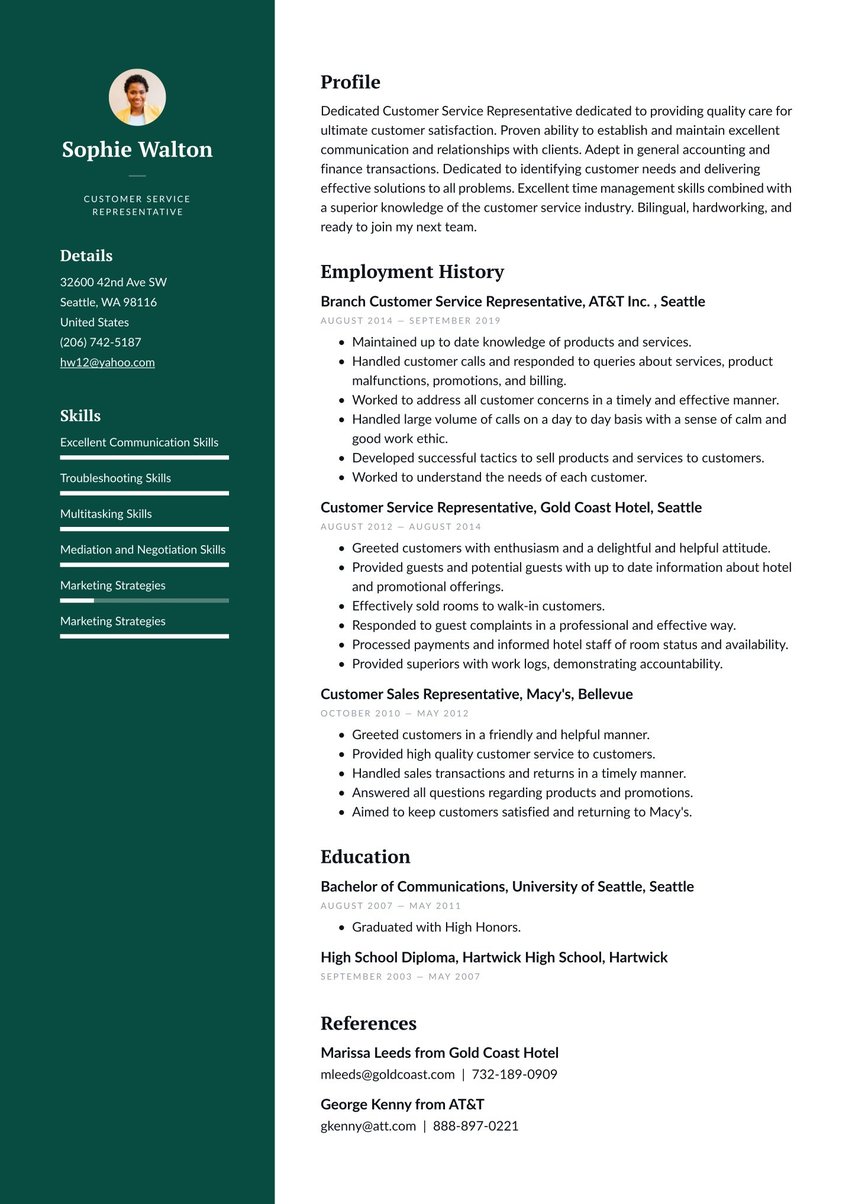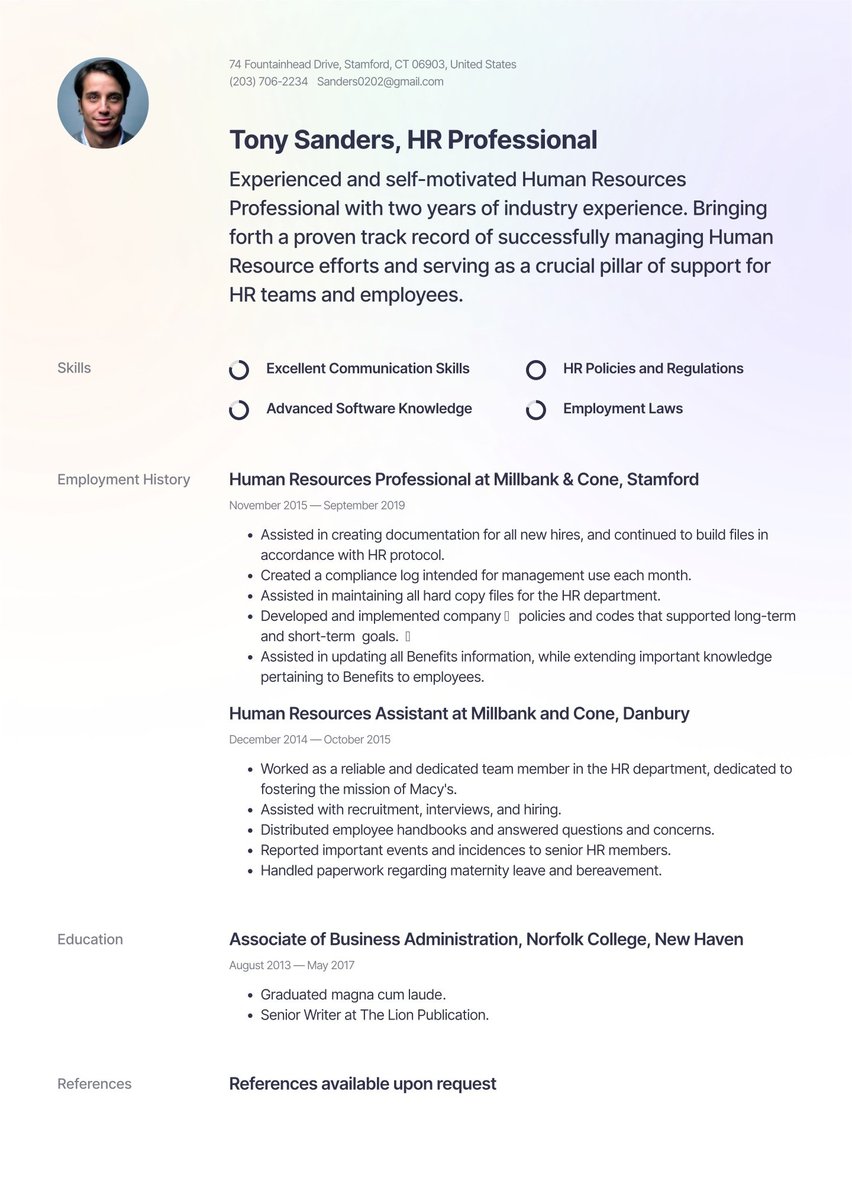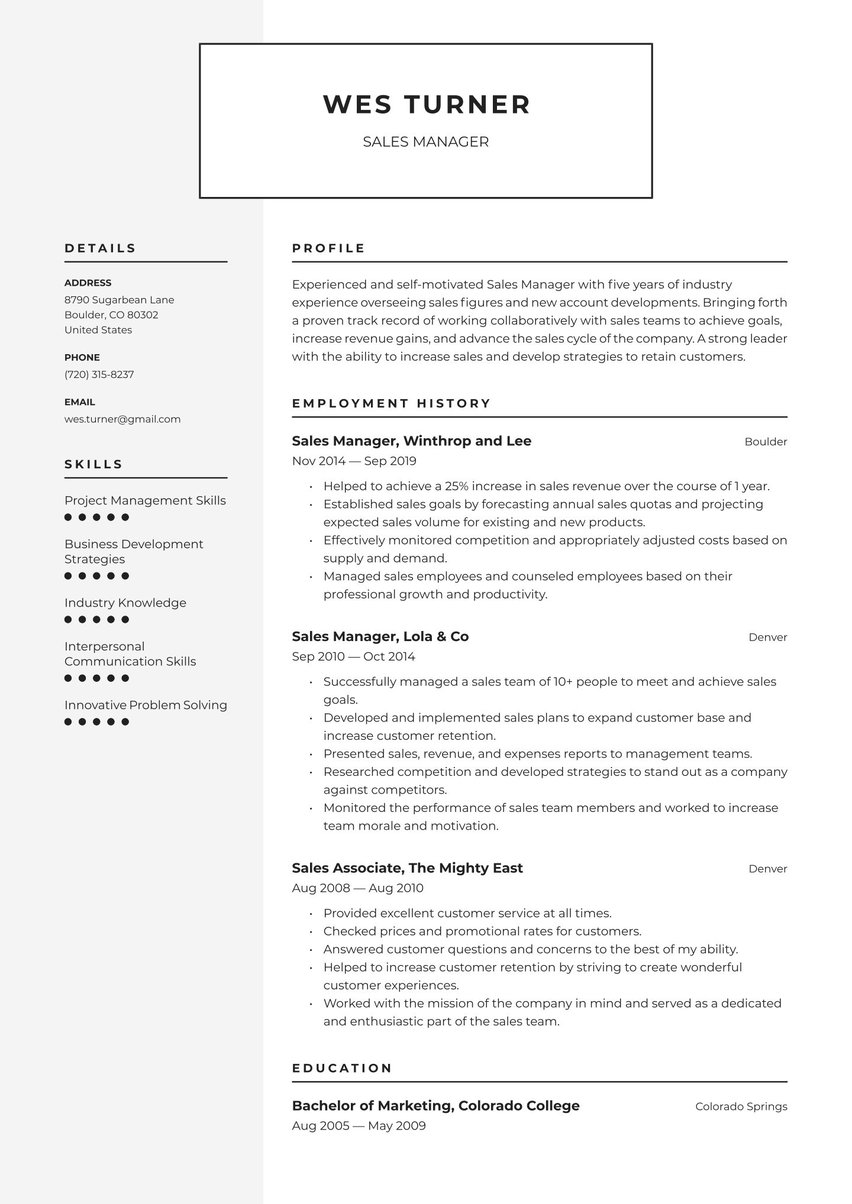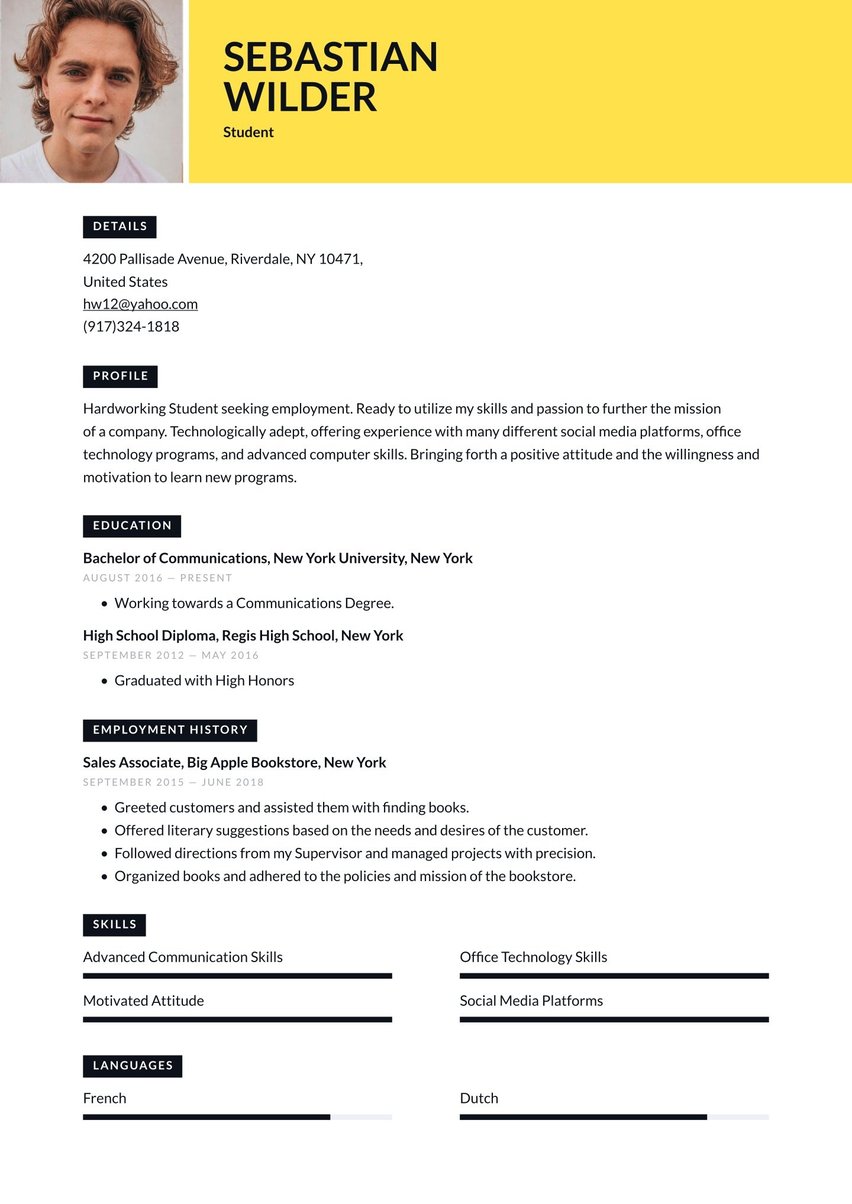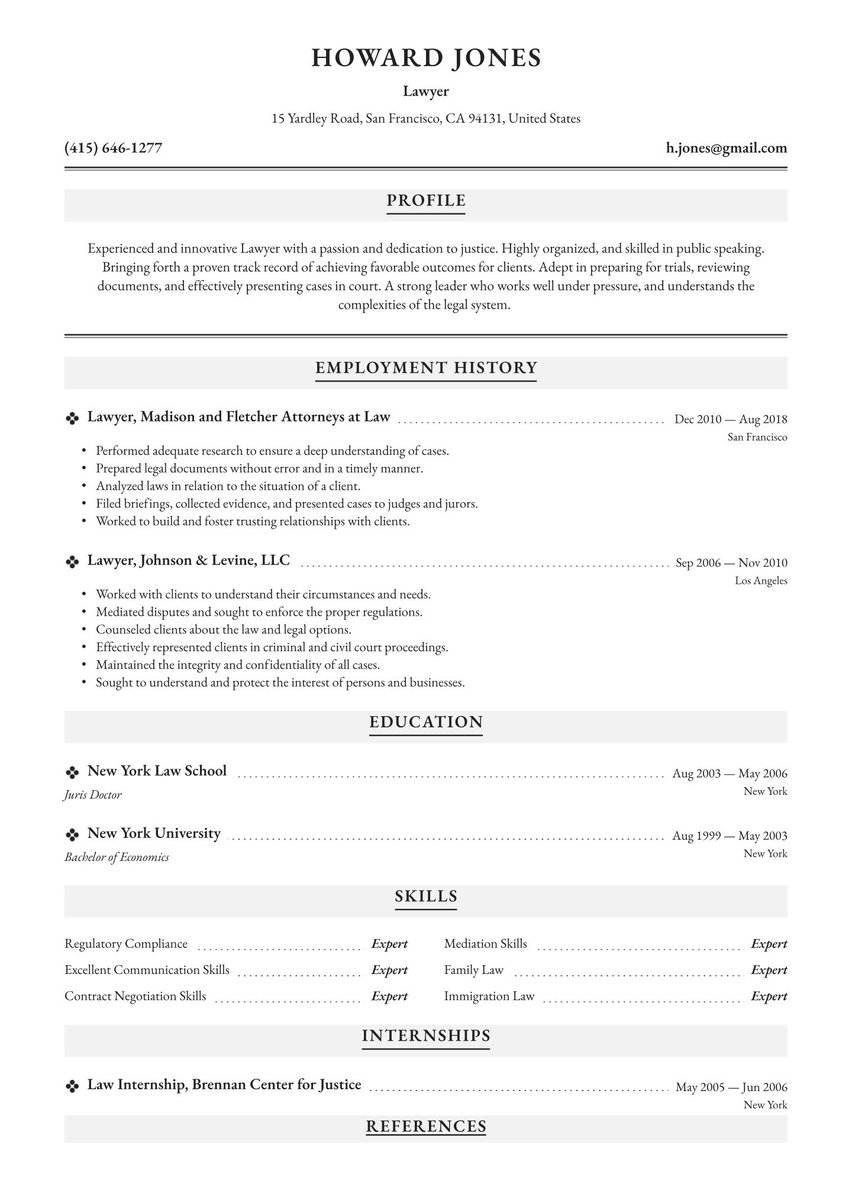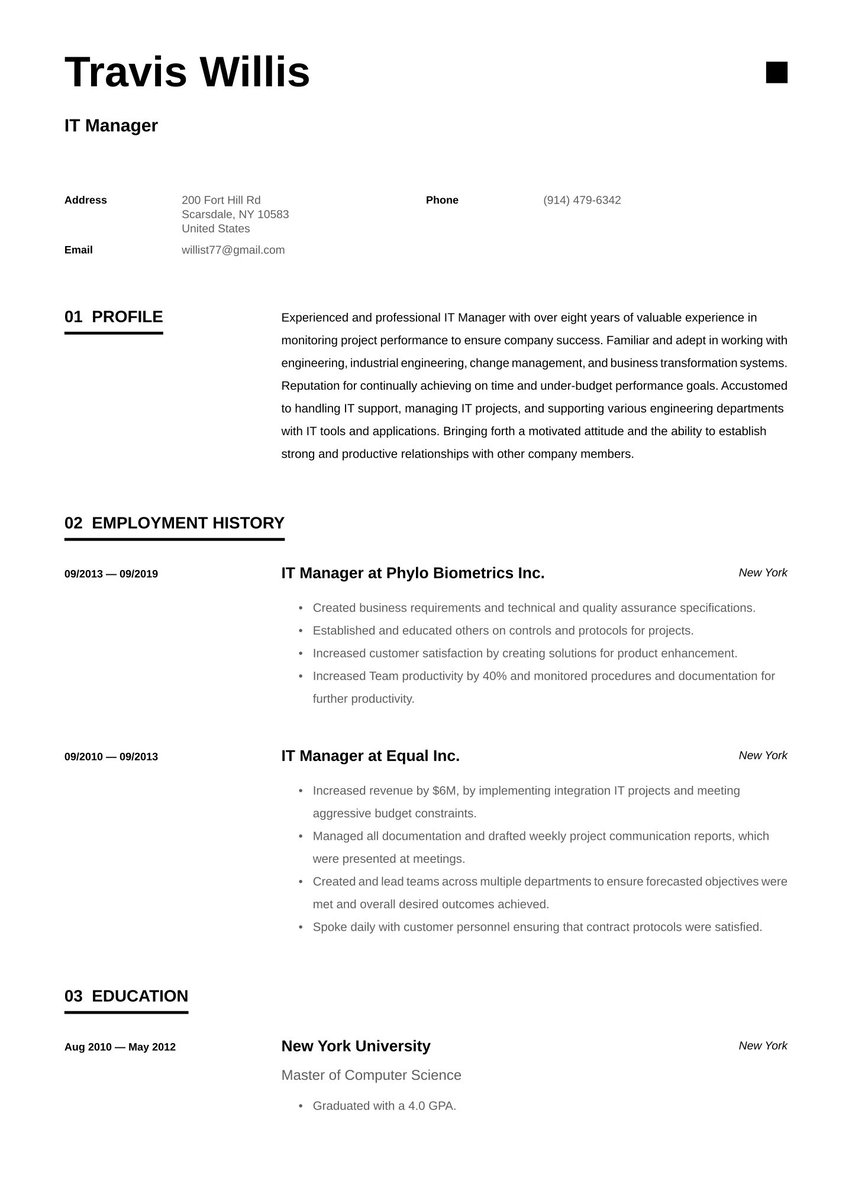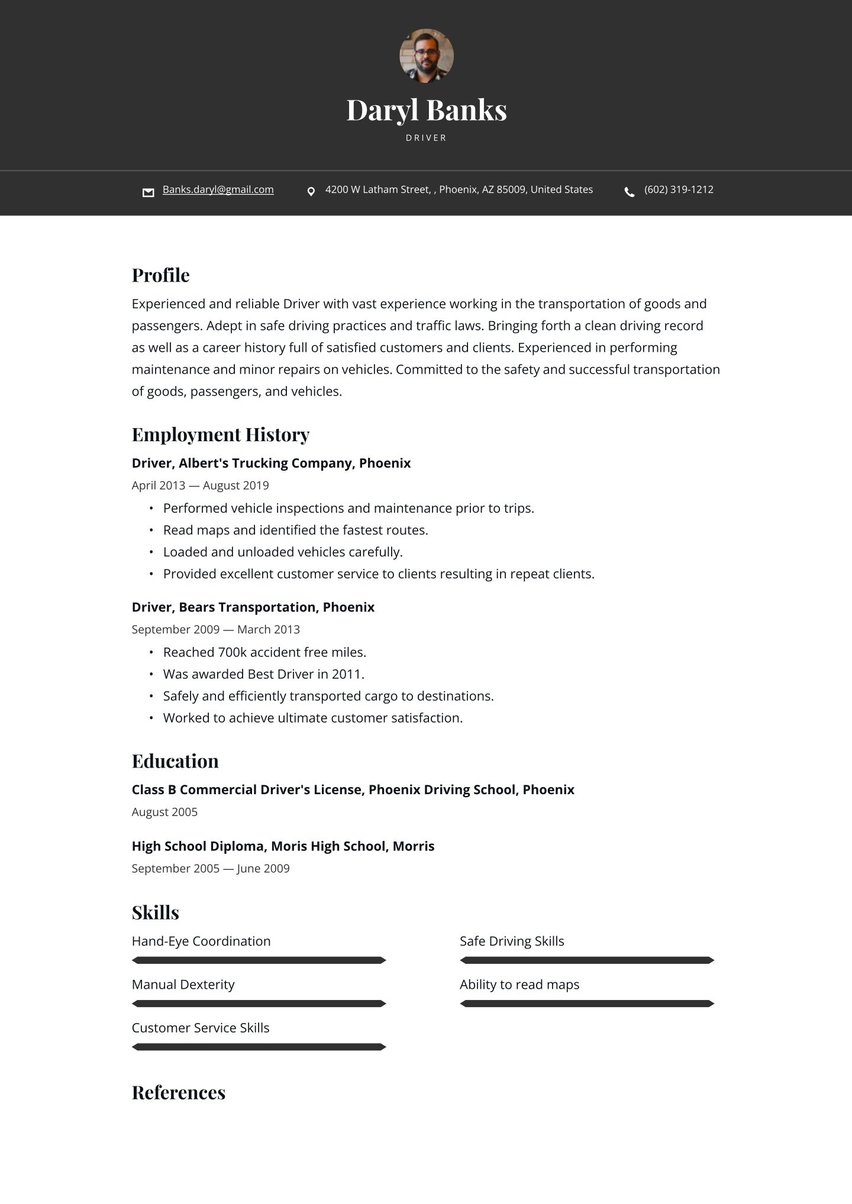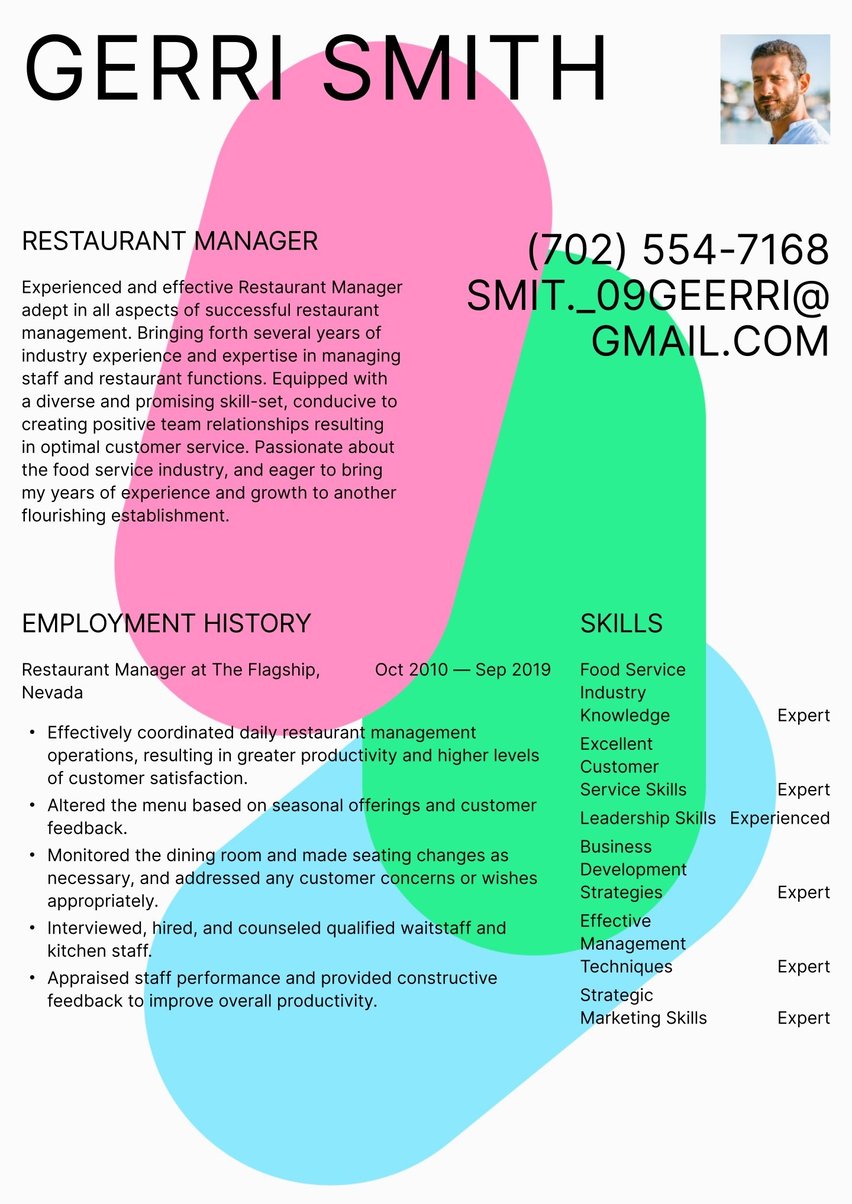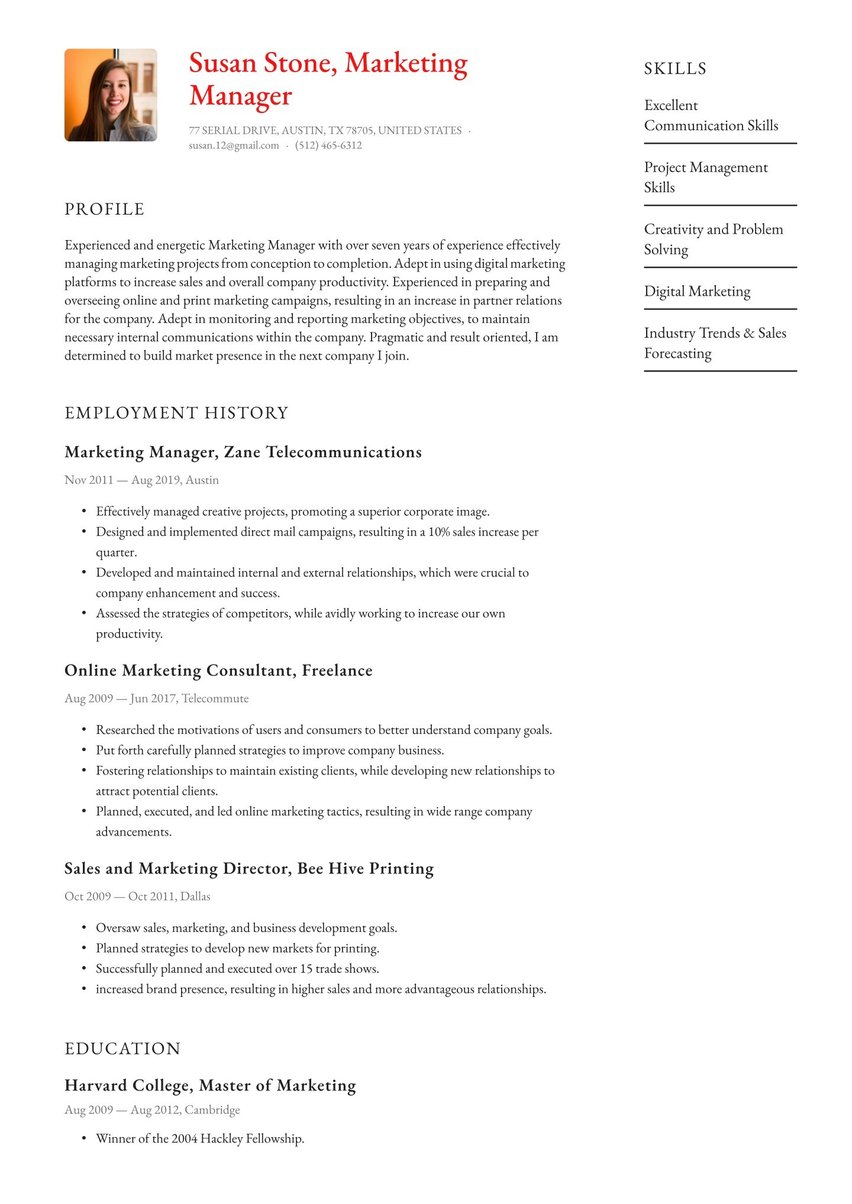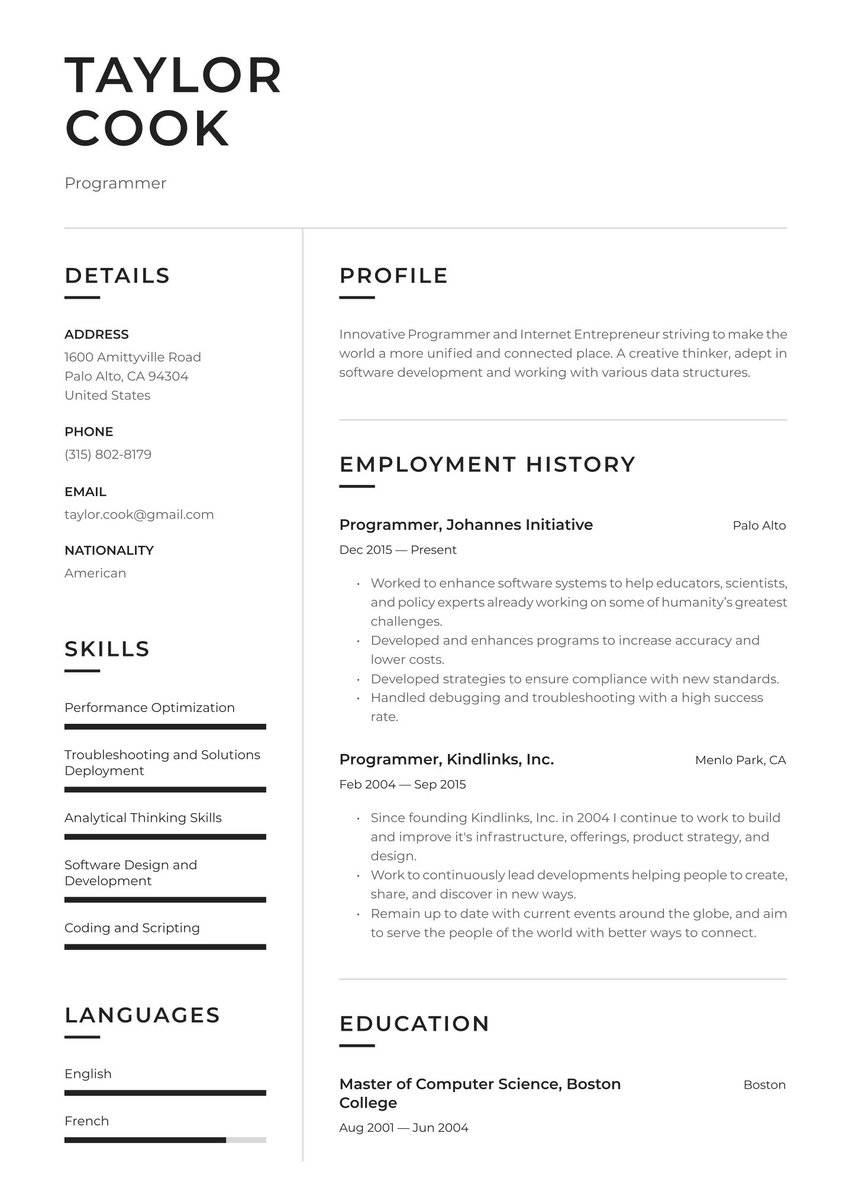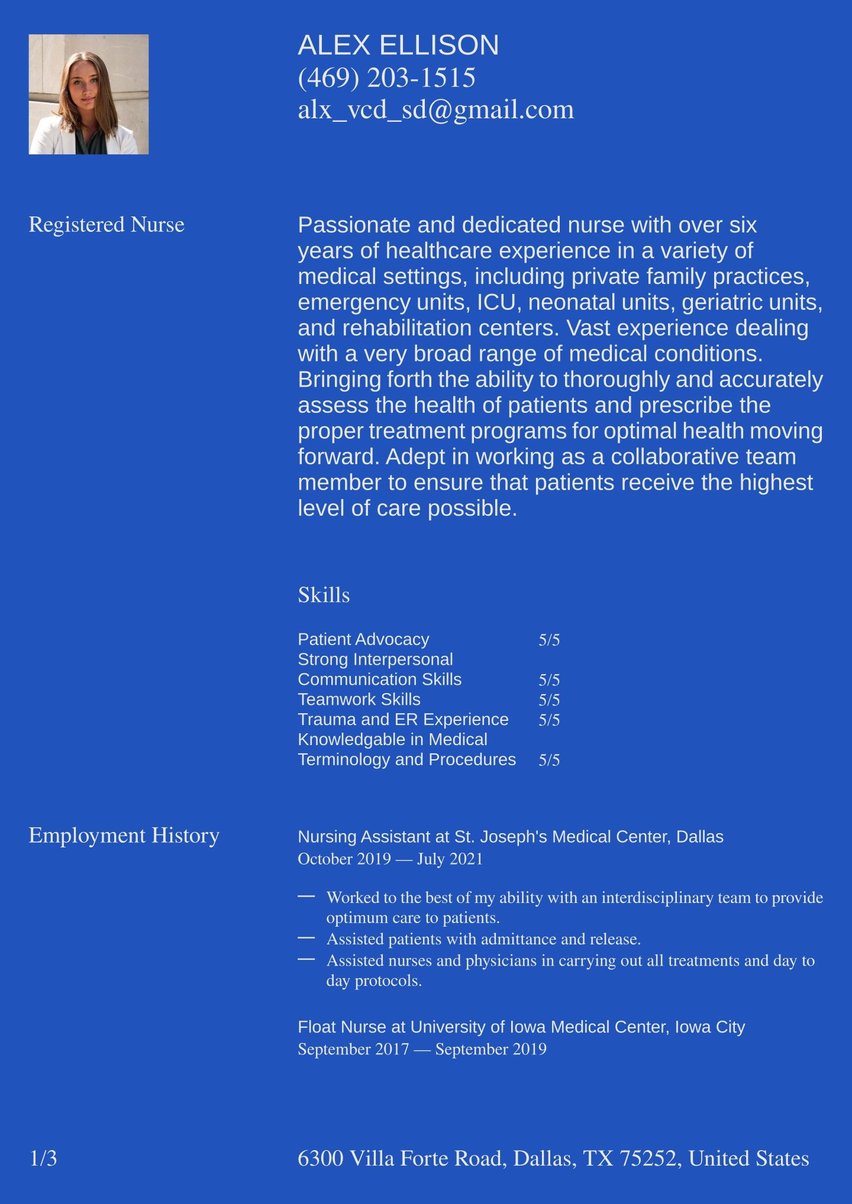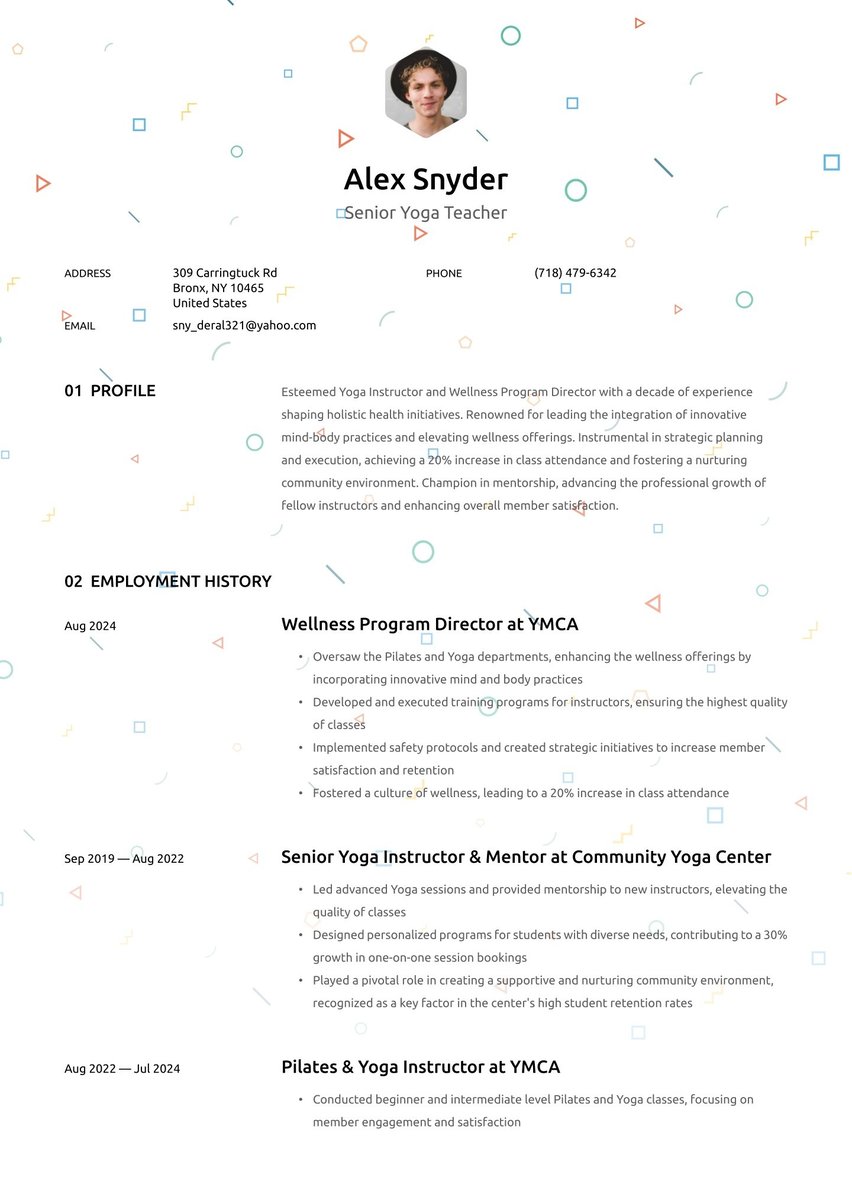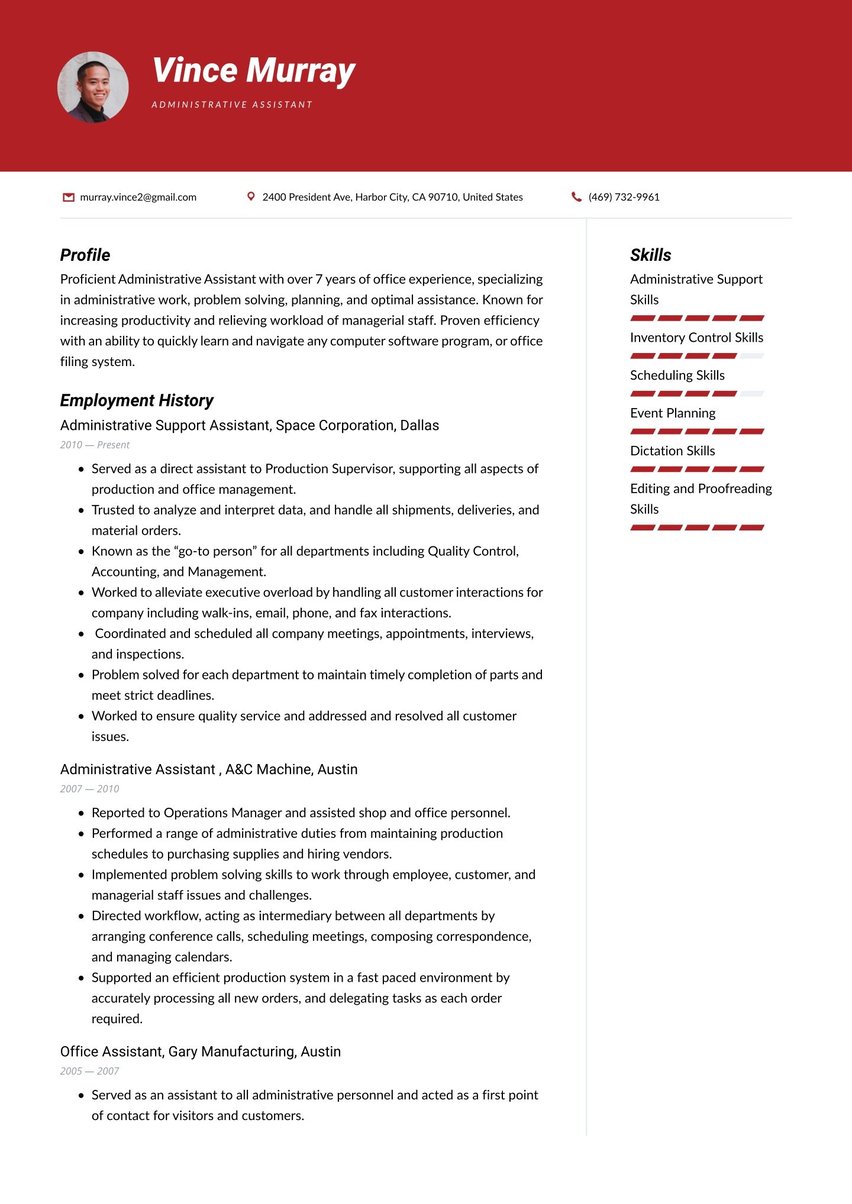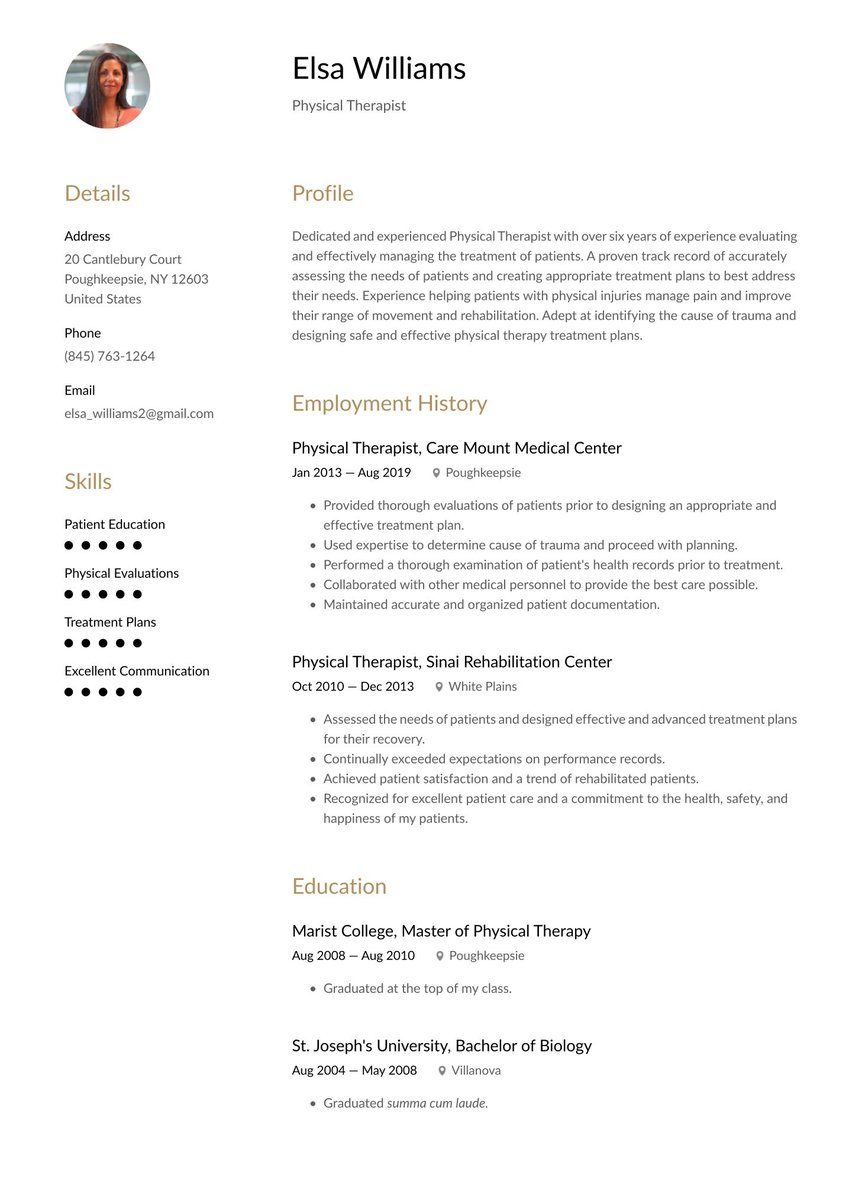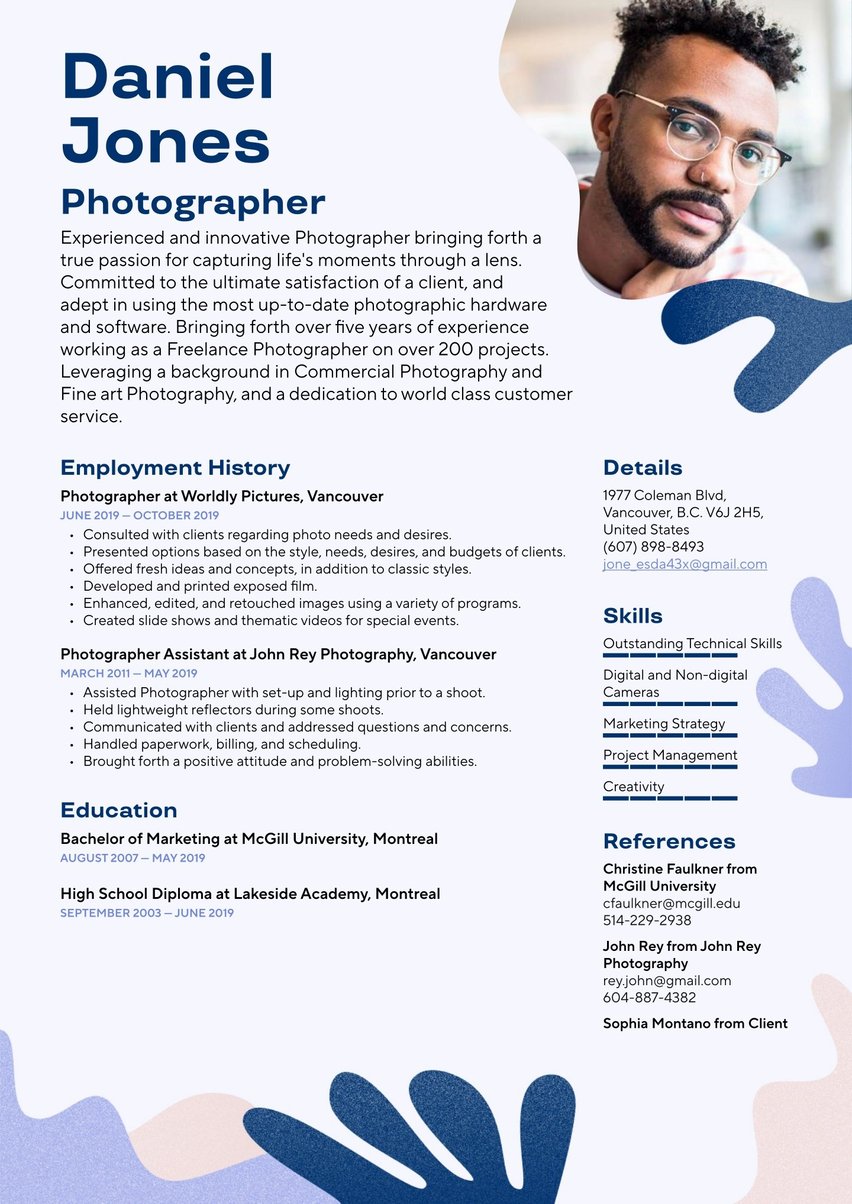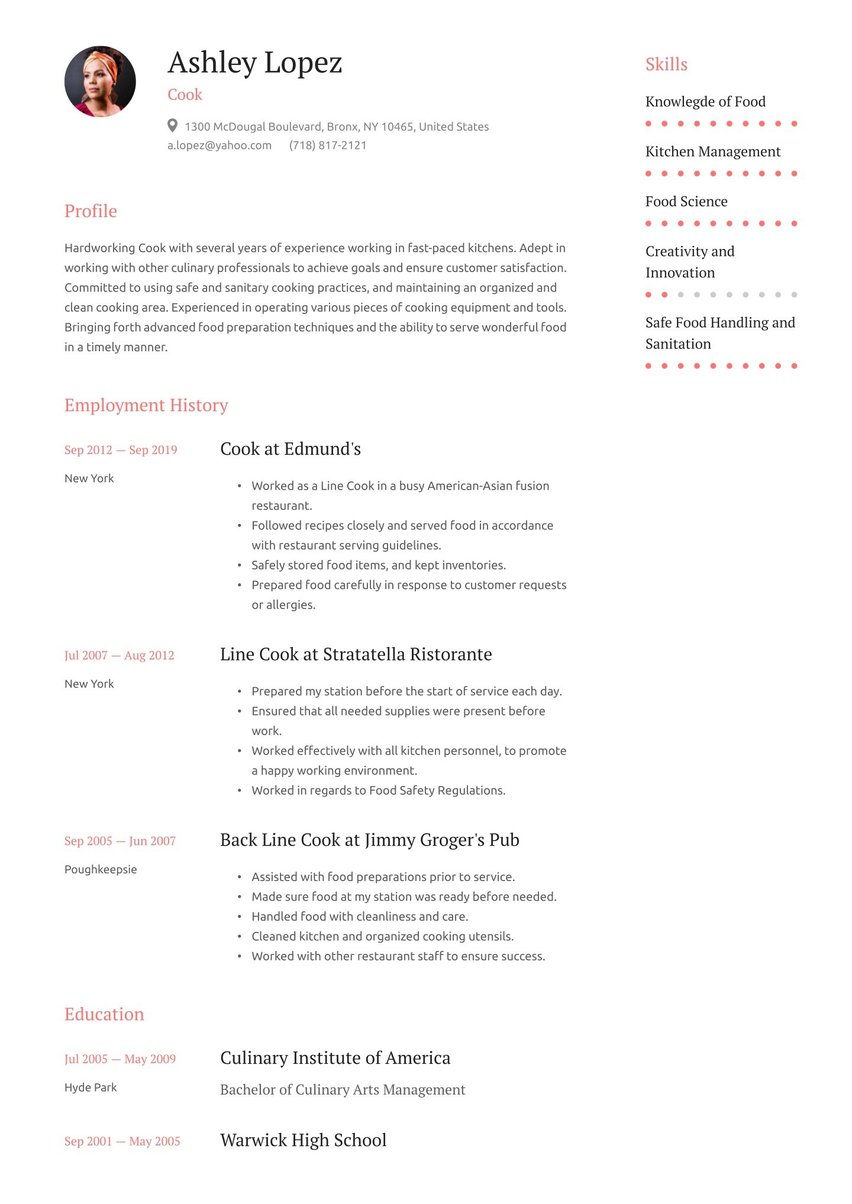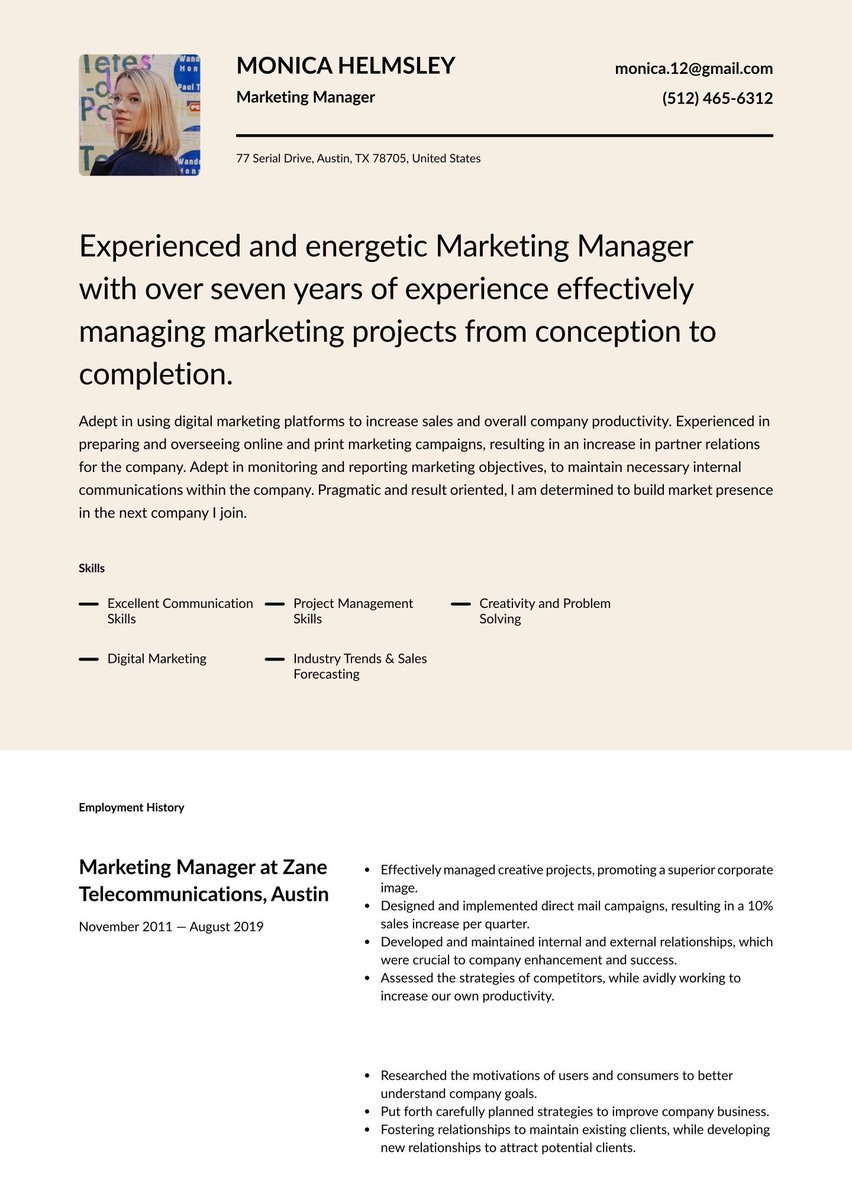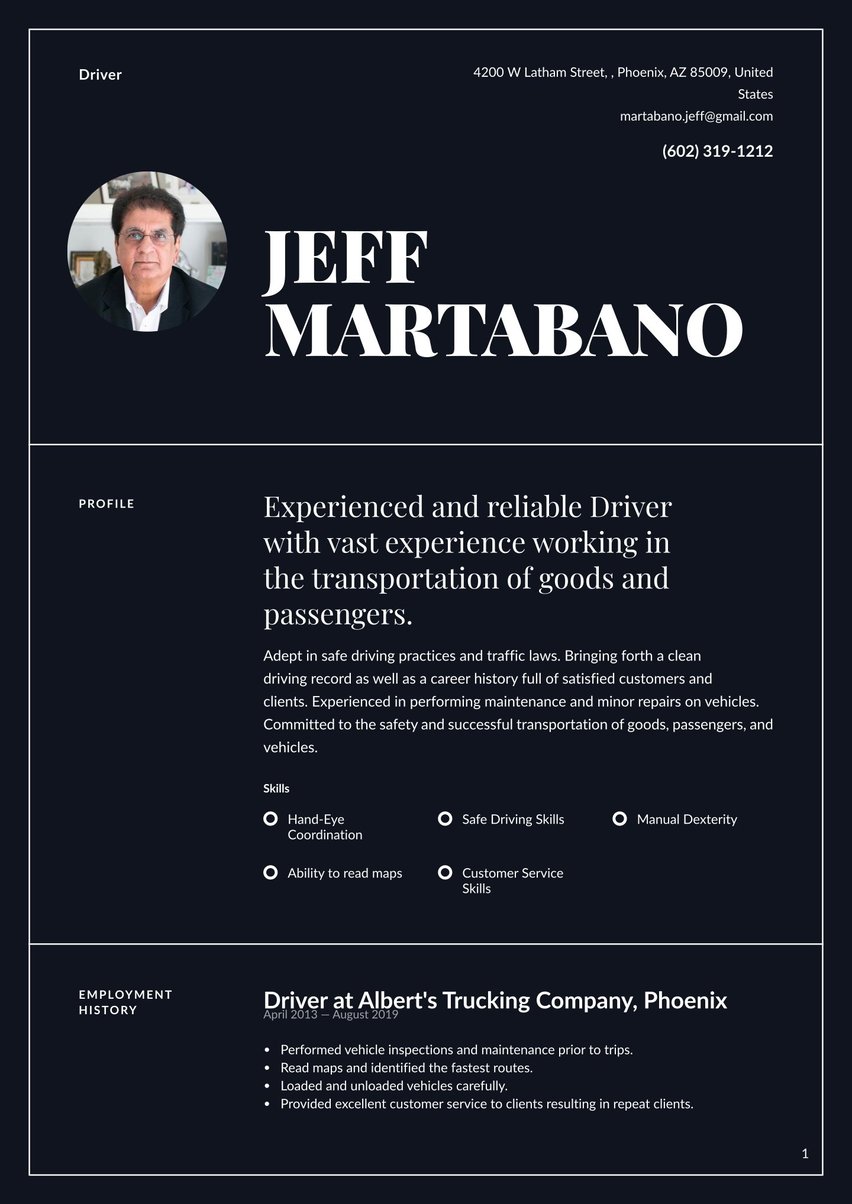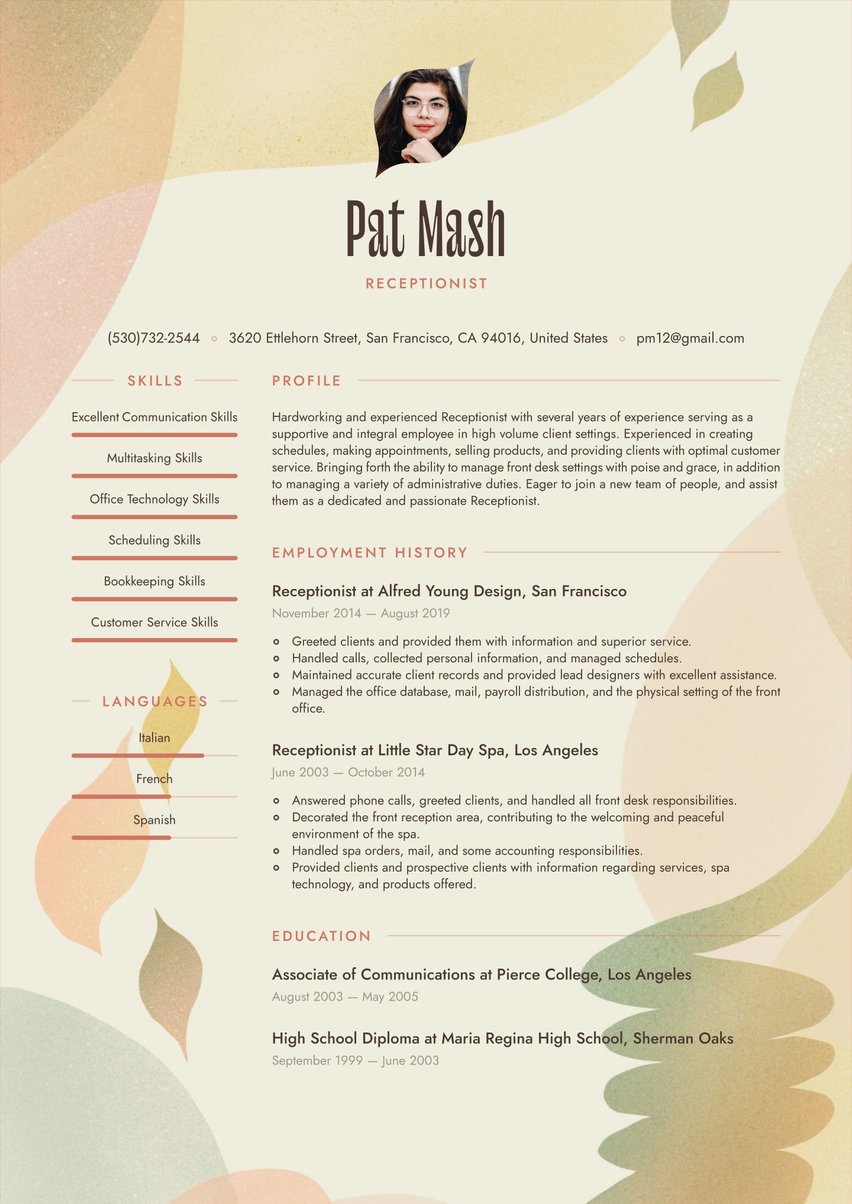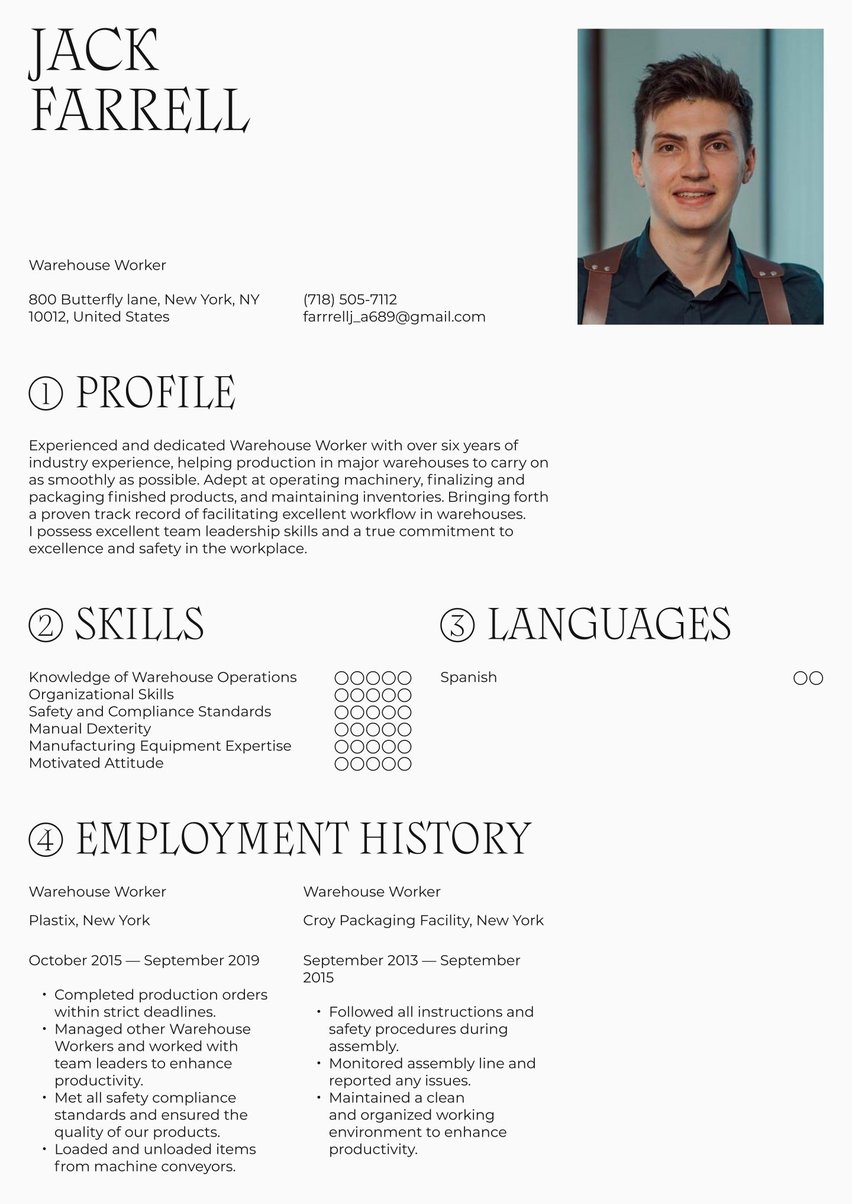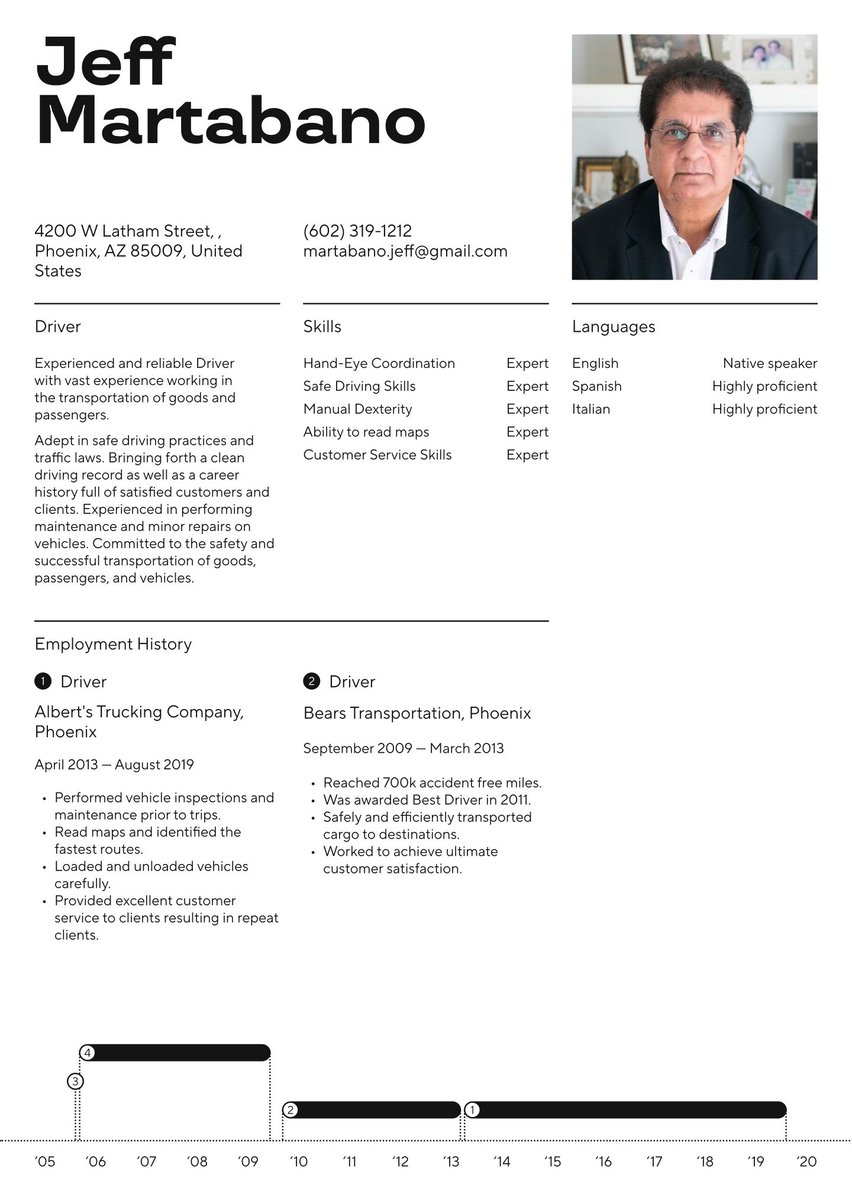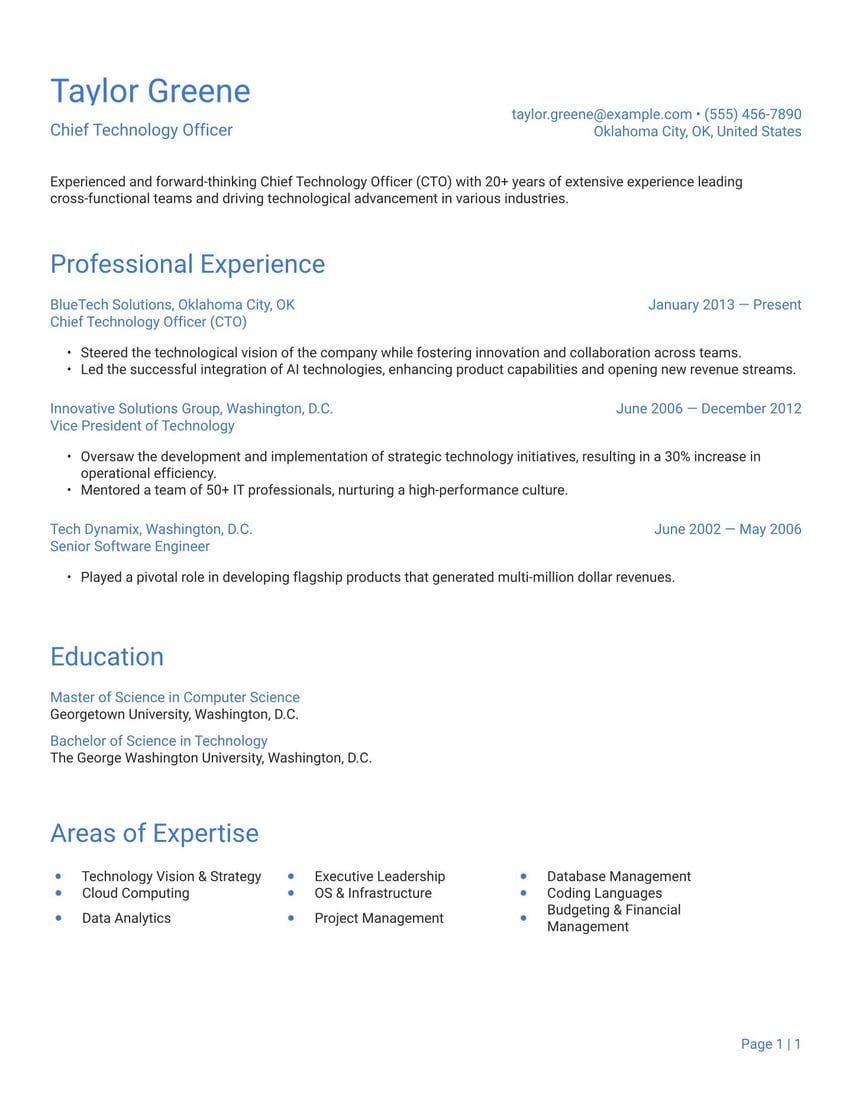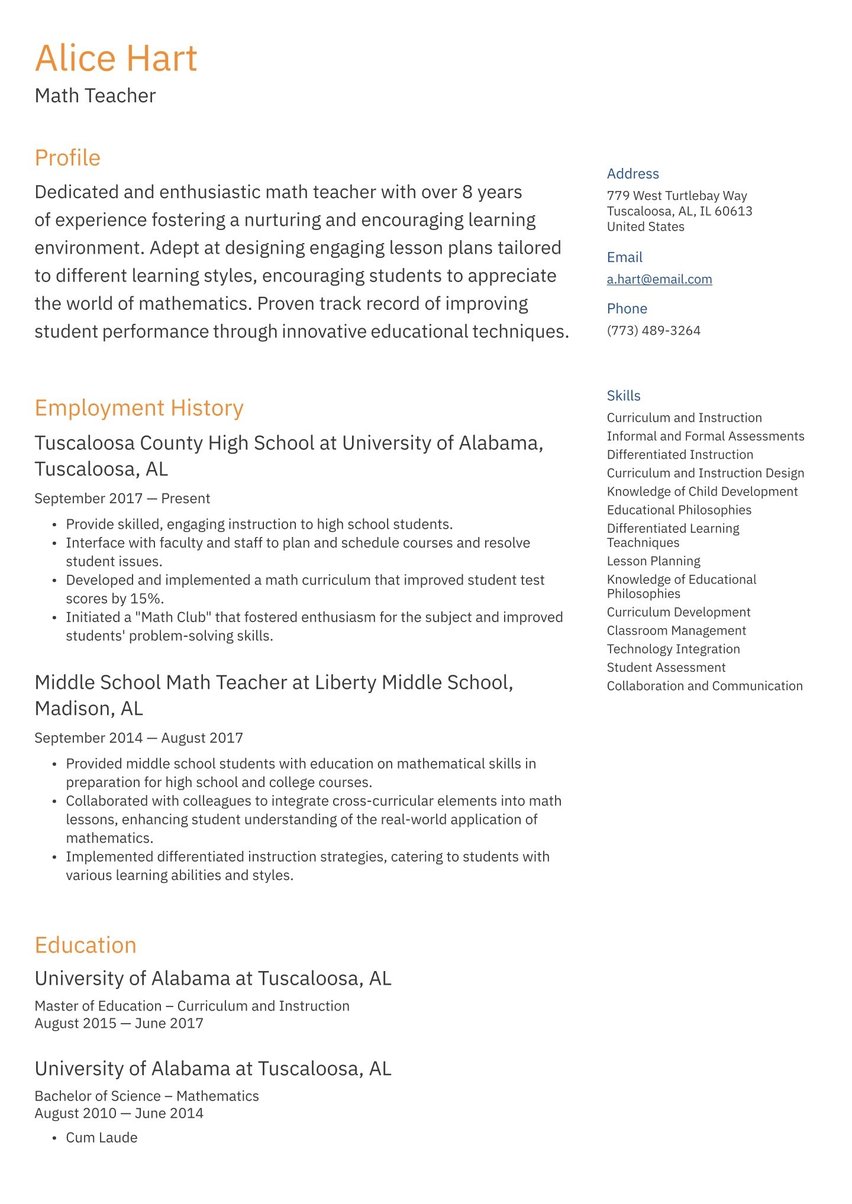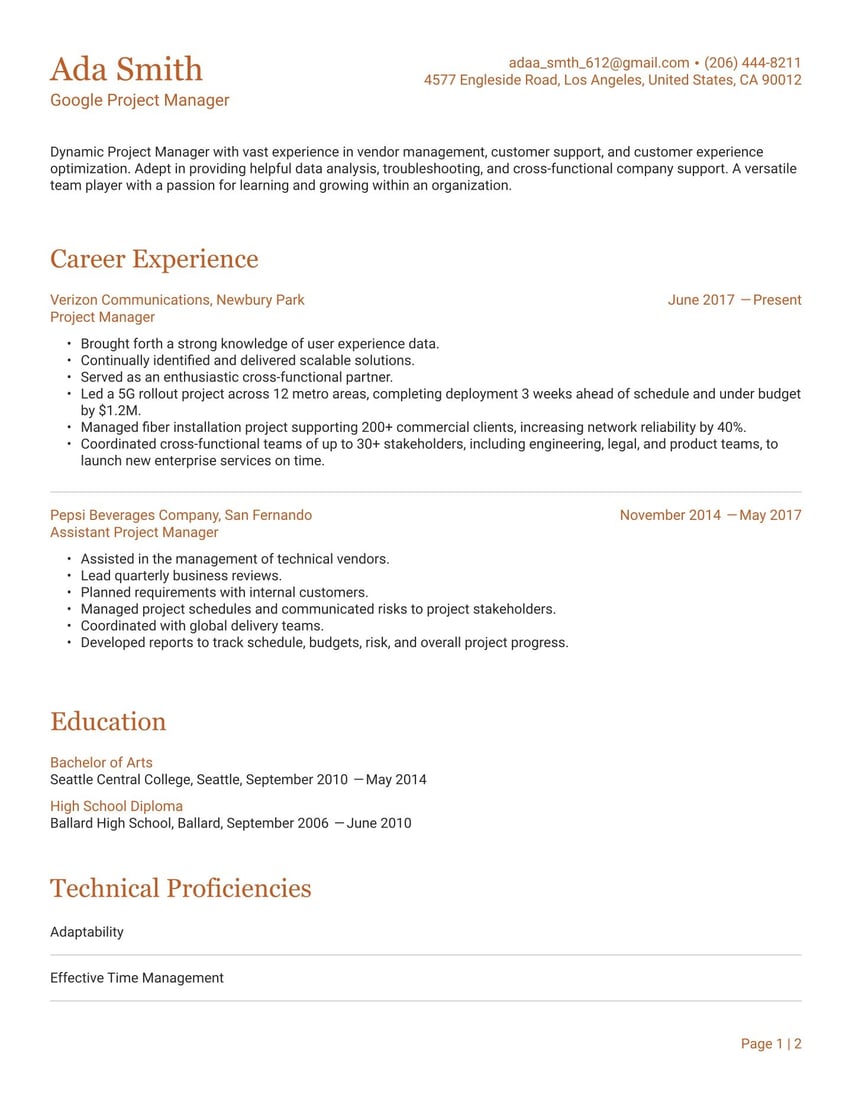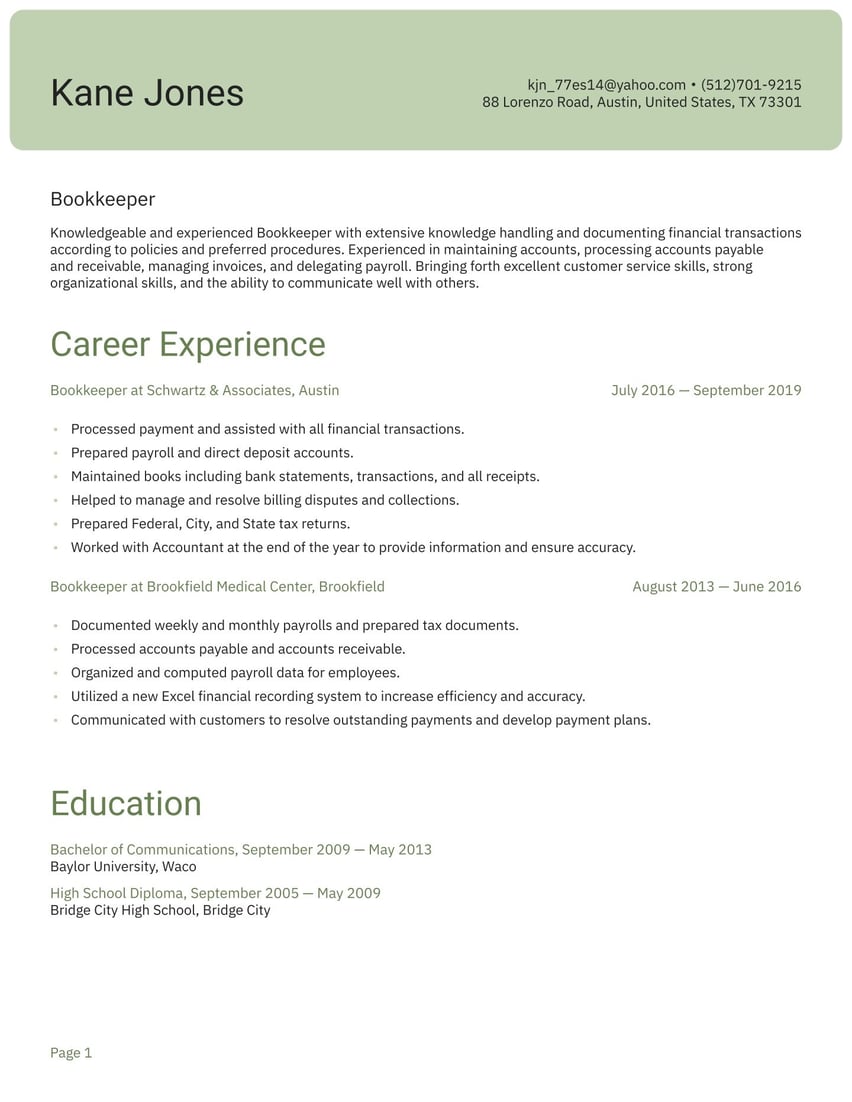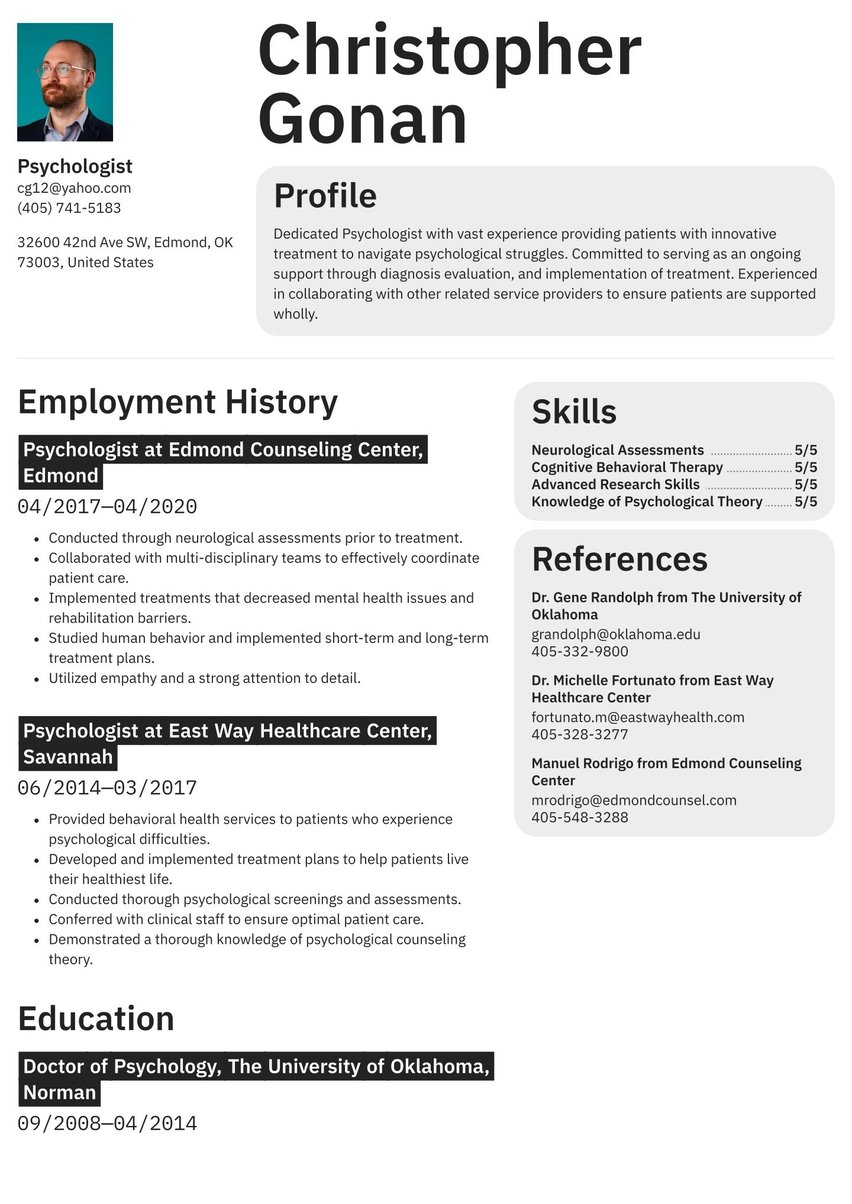Award-winning Executive Chef with over 15 years of culinary experience specializing in farm-to-table cuisine and sustainable kitchen practices. Proven track record of leading high-performing kitchen teams, designing innovative menus, and managing food costs while maintaining exceptional quality standards. Experienced in restaurant openings, menu development, and cultivating relationships with local suppliers. Seeking to bring culinary leadership and innovation to a dynamic restaurant operation.
01/2018 - present, Executive chef, Spruce, San Francisco
Lead culinary operations for Michelin-starred restaurant serving upscale California cuisine with annual revenue of $4.5M
Manage kitchen team of 22 staff, including sous chefs, line cooks, pastry chefs, and dishwashers
Create seasonal menus focusing on locally-sourced, sustainable ingredients, resulting in 25% increase in repeat patronage
Reduced food costs by 8% while maintaining quality through improved inventory management and strategic vendor relationships
Collaborate with restaurant's own 83-acre organic farm to develop specialized produce growing programs
03/2014 - 12/2017, Sous Chef, Chez Panisse, Berkeley
Served as key culinary leader in Alice Waters' iconic restaurant known for pioneering California cuisine and farm-to-table movement
Assisted Executive Chef in daily kitchen operations, menu planning, and staff management
Developed relationships with local farmers and artisanal producers to source highest quality seasonal ingredients
Coordinated special events, including private dining experiences and cookbook demonstrations
Trained and supervised line cooks, emphasizing technical skills and cooking philosophy
07/2011 - 02/2014, Chef de Cuisine, Cotogna, San Francisco
Directed daily kitchen operations for acclaimed Italian restaurant under Chef Michael Tusk
Led a team of 15 kitchen staff in executing rustic Italian menu focused on house-made pastas and wood-fired cooking
Developed seasonal menu items, daily specials, and tasting menus in collaboration with Executive Chef
Implemented and maintained HACCP food safety standards, earning consistent 95%+ health inspection ratings
- Strong Communication Skills
- Culinary Techniques
- Menu Development
- Knowledge of Food Chemistry
- Quality Assurance
- Food Safety and Sanitation Practices
Want to know the secret ingredient for a successful job search? It’s a well-crafted resume.
If you’re applying for jobs, your executive chef resume gives hiring managers the first taste of what you can do. It needs to showcase your culinary expertise, your leadership skills, and your ability to run a kitchen efficiently.
Your resume should also reflect your professional brand as an executive chef. Instead of a bland or generic resume, your executive chef resume should have just the right amount of seasoning to get a hiring manager’s attention.
Your resume is like a tasting menu, providing an overview of what you can offer in your next role. With a dash of creativity and professionalism, you can tell the story of your culinary career and prove that you’re the right chef for the job.
Guide for an executive chef resume example
Turn up the heat on your job search with resume.io. We offer writing guides and resume examples for over 500 professions, and our resume builder makes it easy to whip up a polished resume in minutes.
This resume writing guide and corresponding executive chef resume sample will cover the following:
- How to write an executive chef resume
- Choosing the right resume format
- How to add your contact information
- Writing an impressive summary
- Adding your culinary experience
- How to list your education and relevant skills
- Picking the right resume design and layout
- What the executive chef job market and expected salary looks like
How to write an executive chef resume
Before you start writing your resume for executive chef jobs, you need to know what information to include. Your resume should have these sections:
- A resume header
- A resume summary or profile
- An employment history section
- A resume skills section
- An education section
Once you have these ingredients, you can mix them together to create the perfect resume. As you write your executive chef resume, keep these tips in mind:
- Highlight your impact as a head chef. At this point in your career, you should have many accomplishments to showcase on your resume. Describe the value you’ve delivered in your other roles, using data and numbers to show your credibility.
- Tailor your resume to the job. An established fine-dining restaurant will have different needs than an up-and-coming bistro serving locally sourced cuisine. Adjust your resume to match the restaurant’s needs, culture, and mission.
- Show a wide range of skills. An executive chef needs to not only have a record of culinary excellence, but also be a strong leader with experience in financial and operational management. Showcase all of these skills on your resume to prove that you can handle the job’s responsibilities.
- Keep the ATS in mind. Many restaurants, hotels, and hospitality companies use applicant tracking system (ATS) software to scan and filter resumes. Include enough resume keywords to get your resume through these systems.
Optimize your resume for the ATS
Without keywords, an ATS may decide that your executive chef resume doesn’t make the cut, getting it tossed out before it even reaches a human recruiter. To pass this screening, you need to optimize your resume with relevant keywords.
For example, an executive chef job posting might list these requirements:
- Menu development
- Inventory control
- Culinary operations
- Food safety certifications
For this job, you should do your best to include those keywords on your resume. Here’s an example of how you could use them in your resume summary:
Experienced executive chef with over eight years of experience overseeing culinary operations in fast-paced establishments. Skilled in seasonal menu development and inventory control. Up to date on all food safety certifications and food handling protocols.
For more information, read our article on resume ATS optimization.
Choosing the right format for an executive chef resume
Like the menus you create, your resume should be balanced and appealing to the audience. For most executive chefs, the reverse-chronological format is the best one to use.
This resume format focuses on your culinary experience by listing your jobs in reverse order, beginning with your most recent position. It’s a good way to show your career progression as you’ve gained skills to lead kitchen teams and design creative menus.
If you’re moving into an executive chef role for the first time, a functional resume format may work better. This type of resume highlights the skills you can bring to the table, rather than focusing on your past job titles.
A combination (or hybrid) resume format may also work well for some chefs, especially if you’re re-entering the industry after a break. This resume combines the functional and chronological formats, which can help you disguise career gaps.
When browsing the resume templates we offer, you can choose the one that works for your experience and skill set. We also have resume examples you can view to see each format in more detail.
Include your contact information
Restaurant owners and hospitality recruiters need to know how to reach you. Provide your contact information in your executive chef resume header. Make sure it’s professional and easy to find.
In your resume header, include your:
- Full name and title. Use your first and last name and your professional title.
- Professional email address. For job applications, make sure you have a professional email address, such as firstname.lastname@email.com.
- Phone number. Include the phone number where hiring managers and recruiters can easily reach you, and ensure that it has a professional voicemail greeting.
- Location. You only need to include your city and state. Don’t list your full mailing address.
- LinkedIn page. If you have an up-to-date LinkedIn profile, include a link in your resume header.
You don’t need to include your:
- Date of birth. It’s unnecessary to include this information, and it may even lead to potential age discrimination.
- Other personal details. You don’t need to provide your marital status, driver’s license number, or other personal details.
- Photo or headshot. For an executive chef role, it’s not necessary to have a photo on your resume.
Patricia Jones
Executive Chef
patricia_jones@email.com
(207) 555-1739
Portland, ME
linkedin.com/patricia_jones
Patricia Jones
Creative Culinary Master
patty_cakes@email.com
(207) 555-1739
123 Bryant Street
Portland, ME 04019
Happy wife, mother, and grandmother
Make use of a resume summary
Just as an appetizer sets the tone for a meal, your executive chef resume summary creates a first impression for hiring managers and recruiters. It should give them a taste of your skills and experience—and leave them wanting more, of course.
In two to three sentences, summarize your experience and highlight some big achievements you’ve had in your career. For example, you might mention your record of five-star reviews or an award you’ve won for culinary excellence.
Focus on the value you can bring to a new team and the skills that make you shine as a chef. Include one or two quantifiable metrics related to your experience, such as how much food waste you reduced in your last role.
The resume summary is also where you can introduce your professional brand to prospective employers. Think about the traits you want to convey. Do you want them to see a visionary chef who creates exceptional dining experiences? A strong leader known for nurturing talent in the kitchen? Use your summary to define your brand and frame your career narrative.
Want more inspiration for writing an award-winning summary? Check out these related resumes:
View adaptable summaries from entry-level, mid-level, and experienced executive chef resume examples below:
Detail-oriented chef with a passion for locally sourced cuisine and 5 years of experience as a sous chef. Known for leading with composure in high-stress environments and designing curated menus that delight guests, resulting in a 25% increase in repeat diners.
Innovative executive chef with 7+ years of experience managing kitchen teams in upscale and high-volume restaurants. Expert in cutting operational costs by up to 10% through effective inventory management. Skilled in seasonal menu development and team training and development.
Award-winning executive chef with over 15 years of culinary experience specializing in farm-to-table cuisine and sustainable kitchen practices. Proven track record of leading high-performing kitchen teams, designing innovative menus, and managing food costs while maintaining exceptional quality standards. Experienced in restaurant openings, menu development, and cultivating relationships with local suppliers. Seeking to bring culinary leadership and innovation to a dynamic restaurant operation.
Outline your executive chef work experience: cooking up career wins
Turn up the sizzle in your work experience section. In this part of your executive chef resume, prove you’re the best chef to lead a kitchen by showing employers what you’ve done throughout your career.
Outline your work experience in reverse order, starting with your current or most recent position. List each culinary job you’ve had for the last 10 to 15 years. If you have additional experience, include it in a separate section called “Other Experience.”
Under each job, use bullet points to describe your leadership, creativity, and efficiency. Start your bullet points with powerful action verbs, such as:
- “Directed”
- “Curated”
- “Streamlined”
- “Boosted”
- “Conceptualized”
Don’t just tell an employer about the duties you had in other jobs. Prove how well you did those tasks by emphasizing the results of your work.
For example, consider these task-focused bullet points:
- “Oversaw kitchen operations and managed staff.”
- “Created seasonal menus throughout the year.”
Chances are, numerous other applicants will have similar bullet points on their executive chef resumes. Make your experience and expertise stand out with results-focused bullet points. Where you can, include quantifiable data and metrics to support your experience.
Consider these reworked versions of the above bullet points:
- “Directed daily kitchen operations and oversaw a 15-member team, improving service efficiency by 30% within one year.”
- “Designed and launched four seasonal menus for annual special events, contributing to a 14% increase in average ticket sales.”
These bullet points show hiring managers that you have more to offer beyond excellent cooking skills. They position you as a true culinary force who can serve up impressive results.
Check out the executive chef resume sample of an employment history section below:
Executive chef at Spruce, San Francisco
January 2018 - Present
- Lead culinary operations for Michelin-starred restaurant serving upscale California cuisine with annual revenue of $4.5M
- Manage kitchen team of 22 staff, including sous chefs, line cooks, pastry chefs, and dishwashers
- Create seasonal menus focusing on locally-sourced, sustainable ingredients, resulting in 25% increase in repeat patronage
- Reduced food costs by 8% while maintaining quality through improved inventory management and strategic vendor relationships
- Collaborate with restaurant's own 83-acre organic farm to develop specialized produce growing programs
Sous Chef at Chez Panisse, Berkeley
March 2014 - December 2017
- Served as key culinary leader in Alice Waters' iconic restaurant known for pioneering California cuisine and farm-to-table movement
- Assisted Executive Chef in daily kitchen operations, menu planning, and staff management
- Developed relationships with local farmers and artisanal producers to source highest quality seasonal ingredients
- Coordinated special events, including private dining experiences and cookbook demonstrations
- Trained and supervised line cooks, emphasizing technical skills and cooking philosophy
Chef de Cuisine at Cotogna, San Francisco
July 2011 - February 2014
- Directed daily kitchen operations for acclaimed Italian restaurant under Chef Michael Tusk
- Led a team of 15 kitchen staff in executing rustic Italian menu focused on house-made pastas and wood-fired cooking
- Developed seasonal menu items, daily specials, and tasting menus in collaboration with Executive Chef
- Implemented and maintained HACCP food safety standards, earning consistent 95%+ health inspection ratings
Include your key skills relevant to being an executive chef
Like ingredients in a recipe, your skills are the key to your success. Choose the most relevant skills for the role you’re seeking. Include both hard and soft skills to show that you’re a well-rounded chef and leader.
Hard skills, such as menu planning and food safety protocols, are the technical abilities you bring to a kitchen. A resume for an executive chef should focus primarily on these types of skills.
However, you should also include a few soft skills, like communication, organization, and time management. These interpersonal skills demonstrate your ability to lead teams and drive efficiency, even in a fast-paced kitchen environment.
When using our resume builder, you can choose from pre-written skills and include your proficiency level in each one. You can also write in other skills you want to mention.
Here’s the skills section of our executive chef resume example:
- Strong Communication Skills
- Culinary Techniques
- Menu Development
- Knowledge of Food Chemistry
- Quality Assurance
- Food Safety and Sanitation Practices
While a skills section allows an employer to review your proficiencies quickly, it shouldn’t be the only place where you discuss your skills. Mention your skills in other areas, such as your professional summary and work experience sections.
For example, you can discuss these skills in other parts of your executive chef resume:
- Leadership skills. Describe the way you manage and inspire teams to do their best work.
- Menu development skills. Explain the planning and execution behind new recipes, menu launches, or special events.
- Time management skills. Discuss the ways you’ve streamlined workflows or improved efficiency in other kitchens.
Still not sure what skills to include? Review the job description again and make sure that you’re highlighting the skills you find listed there.
![https://resume.io/app/create-resume/?utm_source=resumeio&utm_medium=blog&utm_camp[%E2%80%A6]anabuilder&utm_content=cta_banner_inside&utm_term=resume_builder https://resume.io/app/create-resume/?utm_source=resumeio&utm_medium=blog&utm_camp[%E2%80%A6]anabuilder&utm_content=cta_banner_inside&utm_term=resume_builder](https://40209.cdn.cke-cs.com/IqAQDlIhtYvhgCGhpc5C/images/f1e6b7994c1b4215f4729d28328b48bc74bd6f8fd0d88842.jpg)
Detail your education & relevant executive chef certifications
More than likely, a restaurant manager or recruiter will be more interested in your work experience and skills. But don’t overlook the importance of your education section. In this area, you can prove that you have the training and credentials to do the job right.
Describe your education, listing your highest degree or diploma first. If you’ve completed postsecondary education, such as a culinary arts program, you don’t need to include your high school diploma.
In this area, you can also list other culinary training you’ve done, such as:
- Professional certifications. Mention any relevant certifications you’ve earned, such as the Certified Executive Chef credential.
- Formal training. In addition to a culinary arts program, you can mention other formal training you’ve completed, such as an apprenticeship.
- Continuing education. Courses, workshops, or seminars show employers that you’re committed to keeping your skills sharp. For example, you can mention a course you completed in dietary trends.
In most cases, your education section should go near the bottom of your executive chef resume, below your experience and skills. However, if you’ve recently completed your education and you want to highlight it above your work experience, you can move it higher up on your resume.
Associate Degree in Culinary Arts, Hyde Park, NY, 2008, Culinary Institute of America (CIA)
Bachelor of Science in Hospitality Management, San Francisco State University
Pick the right layout & design for an executive chef resume
As an executive chef, you serve beautifully plated dishes, paying attention to the smallest of details. You need to do the same with your resume layout and design. A striking resume design can show off your creativity and innovation.
Choose a clean, organized resume layout. You can use some design elements, like a splash of color, to match your professional brand. However, make sure that you don’t go too far with flashy designs. You want your executive chef resume to be readable and professional.
Use a modern font and bold or underline your section headings to guide the reader through your resume. Leave white space between sections to keep your resume easily readable. Additionally, use bullet points to help a recruiter scan your qualifications quickly.
Want your resume to look as good as the dishes you create? Check out the stylish resume templates we offer in our resume builder. These templates allow you to format and design your resume quickly, so that you can create a resume for executive chef jobs that sets you apart from the crowd.
Executive chef job market & outlook
Many people enjoy eating out, so restaurants are constantly looking for executive chefs who can develop menus, lead teams, and oversee kitchen operations. Now is a good time to be looking for your next executive chef position.
- Employment of chefs and head cooks may grow as much as 8% by 2033, according to the US Bureau of Labor Statistics (BLS).
- There should be around 24,600 openings for executive chefs each year over the next decade.
- By 2033, the BLS projects that there could be 202,600 chefs and head cooks working in the United States.
What type of salary you can expect as an executive chef
Most executive chefs earn a yearly salary. As the leaders of kitchen teams, they usually earn comfortable salaries. On average, executive chefs make $85,354 per year. The salary you earn may depend on several factors, like where you live and how much experience you have.
Key takeaways for building an executive chef resume
Your executive chef resume should show a restaurant owner why you’re the right person to oversee their kitchen operations. It should highlight your culinary expertise, leadership, and ability to thrive in high-pressure environments.
When writing your resume for executive chef jobs, tailor your skills and experience to the new role. Discuss the outcomes of your work and the measurable results you’ve achieved in other jobs. With these ingredients, you’ll craft a well-balanced resume that’s sure to appeal to hiring managers.
Kickstart your job search with our resume builder, but don’t stop there! With resume.io’s 18 powerful tools, you can search for jobs, measure your progress, prepare for interviews, and negotiate your salary, all with our powerful career toolkit at your fingertips.


